



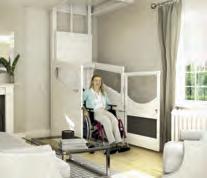





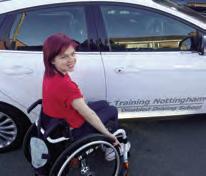
Motoring & Mobility Adapting Your Home Travel Baroness Grey-Thompson DBE Team BRIT ABILITY NEEDS ABILITY NEEDS The essential journal on disability The essential journal on disability SUMMERQ3 2023 £2.00 £2.00 Quarterly
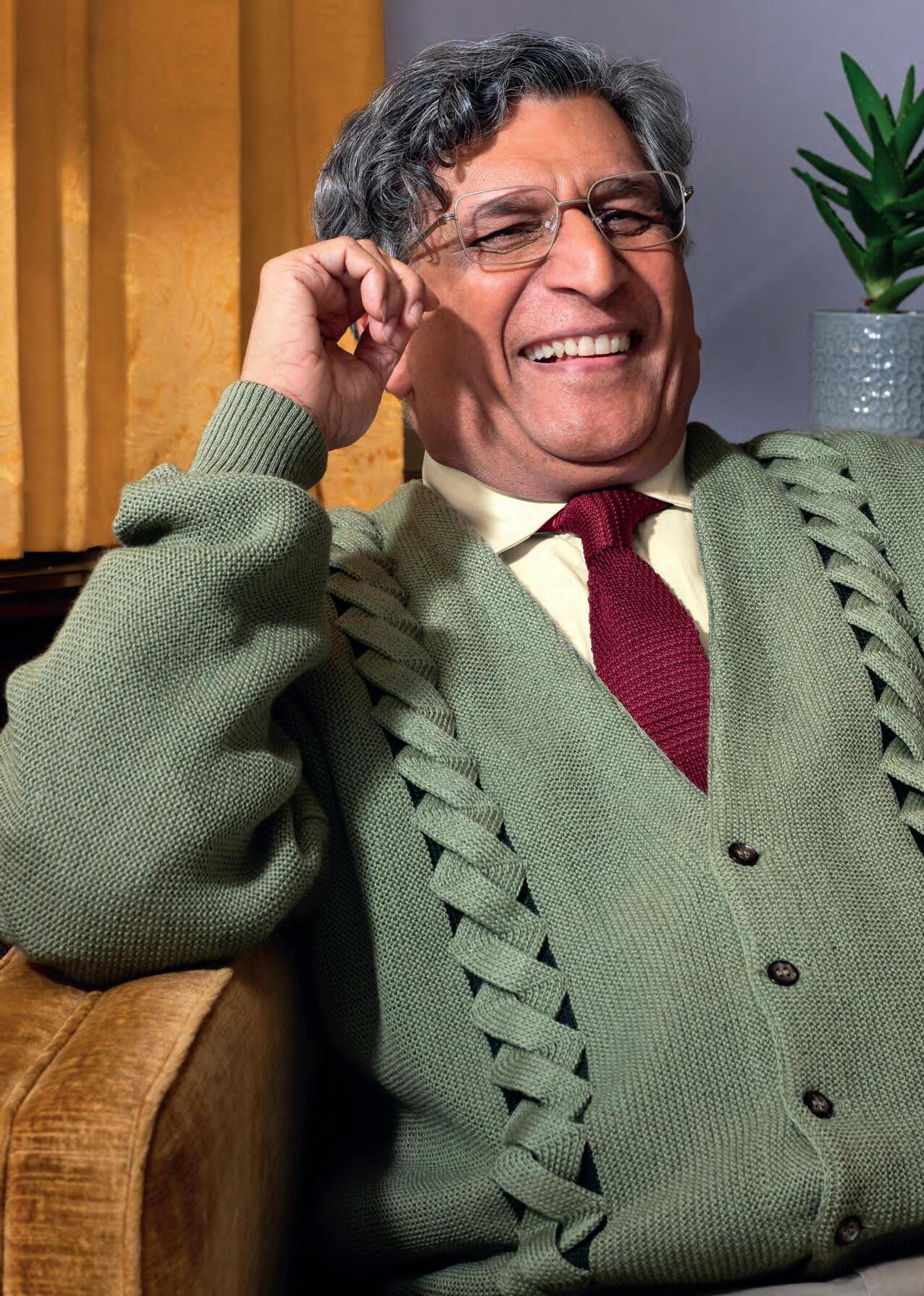



































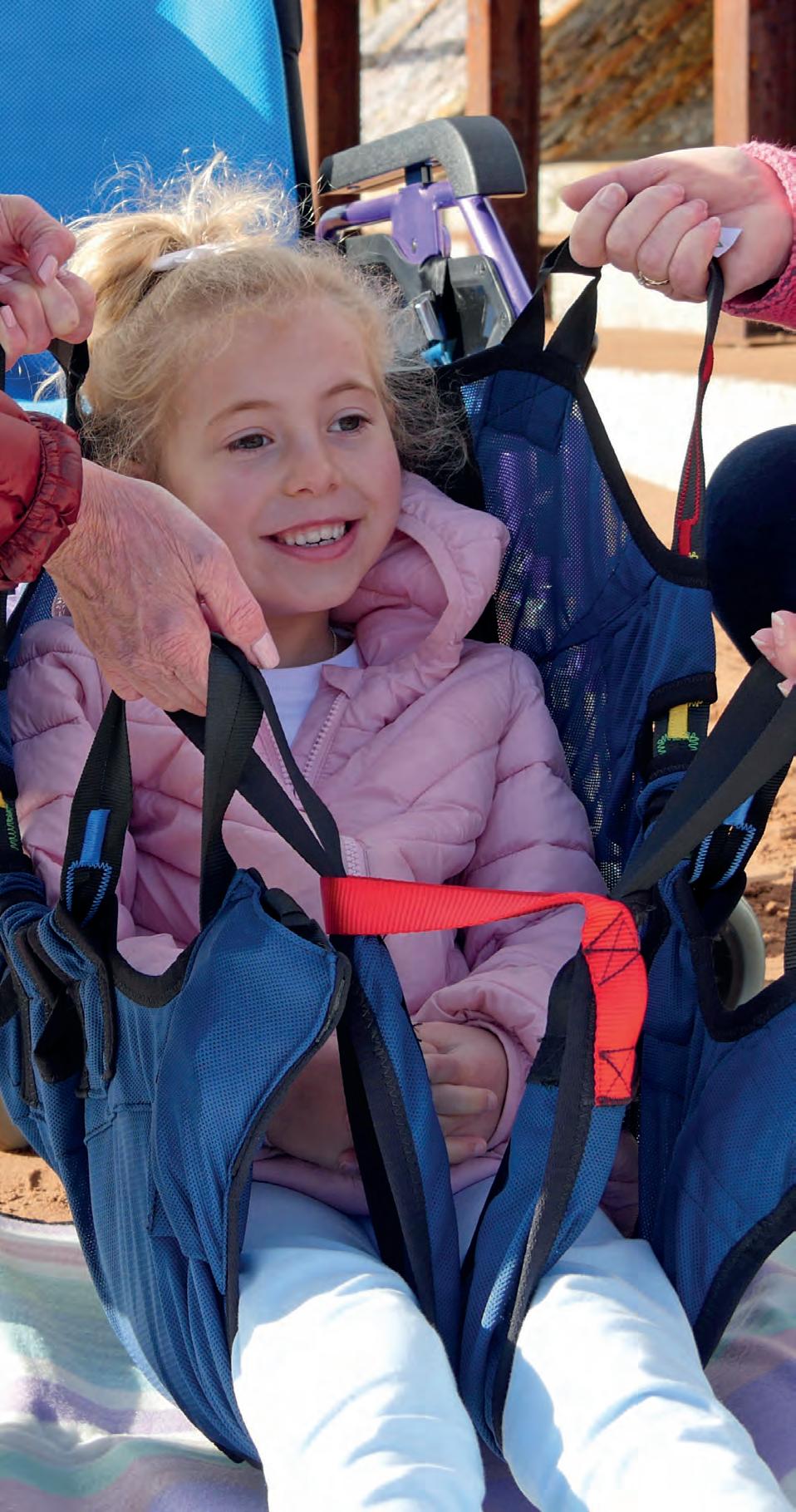

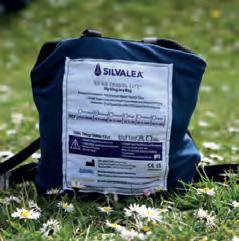

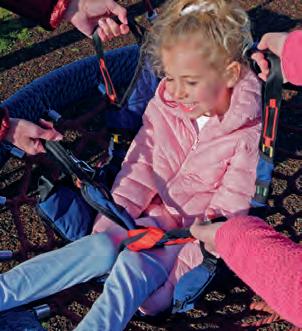


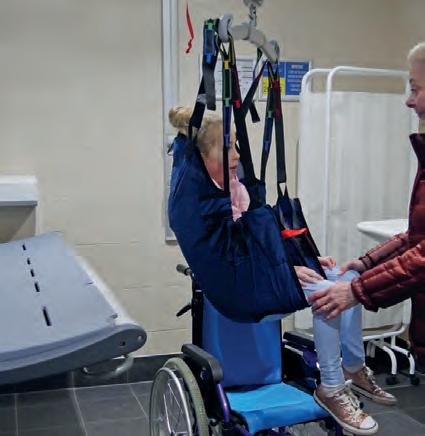




this Summer with Make Memories Silva® Travel-Lite My Sling in a Bag silvalea.com 3
SIL-TL
“ YES ” to every opportunity with your compact ‘Sling in a Bag’ .
transfer during travel and days out has never been easier! Explore new places and enjoy inclusion with endless possibilities. Watch the video for more details... PLAY ME Both a manual and hoistable full body transfer sling in one
Product Code:
Say
Patient
versatile,
Divided or hammock leg position options COOLMAX® is a trademark of The LYCRA Company
A
lightweight sling which folds up into its own bag
- Featuring the latest



20 Tanni’s View
- Baroness Grey-Thompson DBE – Tanni discusses the challenges faced by disabled people who wish to travel by train



28 Eddie Peacock
- Charity begins at home – Eddie discovers the enormous army of volunteers, carers and charity workers in the third sector who generously give their time for social wealth

32 Industry Insight
- Should we curtail the drive for increased Artificial Intelligence? –Angus wonders if some technological advancements are created through need or just because we can, without knowing if they will benefit society as a whole
40 Team BRIT
- Team BRIT begins European racing campaign – Catch up on what’s ahead for the 2023 season, including entry into a new, major European racing championship
47 Tea Break
- Take a break and put your knowledge to the test
Liquick X-treme and Liquick X-treme Plus


Pre-activated,ready-to-useintermittent cathetersystems








The Liquick X-treme catheter system is a readyto-use catheter for intermittent catheterisation that is designed to be intuitive and simple to apply virtually anywhere you need – for X-treme independance and comfort. The new Liquick X-treme Plus catheter system has a preconnected urine bag making it convenient to use whenever you need to catheterise yourself.



For further information or for free samples, please contact us.

ABILITY
2 Ability Needs Magazine 7 Montgomerie Terrace, Ayr, KA7 1JL Tel 01292 287574 Fax 01292 266656 email: abilityneeds@btinternet.com web: www.abilityneeds.co.uk All Rights Reserved No part of this publication may be reproduced or used in any way without written permission of the publisher. The views expressed in this magazine are not necessarily those of the publisher and although every effort has been made to ensure that the information is accurate, the publishers take no responsibility for errors and omissions. No responsibility can be accepted by the publishers for any claims made by the advertisers in this publication. Contents
ABILITY NEEDS ABILITY NEEDS ng &Mobility AdaptingHomeYou Baroness Grey-Thompson DBE Team BRIT ABILITY NEEDS ABILITY NEEDS The essential journal on disability essential on disability SUMMERQ3 2023 £2.00 £2.00 Quarterly Front cover photograph courtesy of Adapt Ability Purchase a digital copy of Ability Needs at www.magzter.com Follow us on
Motoring and Mobility
NEEDS
ABILITY NEEDS
3
vehicles
available
and products
in the mobility marketplace
www.teleflex-homecare.co.uk Teleflex Medical Europe Ltd., IDA Business and Technology Park, Dublin Road, Athlone, Co Westmeath, Ireland Phone +353 (0)9 06 46 08 00, orders.intl@teleflex.com www.teleflex-homecare.co.uk BLADDERMANAGEMENT r -tX X-t k ciuiqL r -tX X-t k ciuiqL MEGANA aemer emer suPl iq r,detavitc-aerPto-ydea smetsy rs etehtacrs tehtaecmert-k timernt iro iutneiobd oeyrehwyny trofmo cnd tsyrsetehtas agmaebnird o tde neou iesu-totnettimretn -ydaes a rmietsyrset noitasiertheta cntett o e tlpmidsneavit e mert-rXod –feeuno kciuq Liw nehe T.t s a amhe o t tneinevnotcginika .flesrou yesiertheta c r fnooitamrofnr . ustcat ocre.acemoh-xeflleet.www echnology P A Business and T ope ID eleflex Medical Eur T ders.intl@teleflex.com www.teleflex-homecar Phone +353 (0)9 06 46 08 00, or , selpmaeserrfor f ku. eland estmeath, Ir ark, W e.co.uk
Get out there with Triride











TRIRIDE ARE A market leader in the production of Power Add-on devices. Whether you want full electrical assistance, or a Hybrid assisted handcycle we have you covered. Simply attach to your manual wheelchair in seconds and discover a new Freedom.


If you are looking for a more physical challenge the Triride Tribike Hybrid provides a simple fun way to keep active and enjoy the road ahead. A hybrid customisable power assist system offers electrical assistance when pedalling which makes tackling those hills a breeze. Combines with a choice of gearing and tyre options the Tribike provides great versatility for most terrains. You even have an ondemand throttle to help get you started on those steeper inclines.
If you’re looking for a more compact option, we also have the Tribike Hybrid available with a 16” wheel providing a super compact footprint and its lightweight frame make the Tribike Hybrid a great transport option. Whether you need full electric or the active hybrid option, enjoy the great outdoors with friends and family.
The Triride Special Compact HT with all road tyre is a great all-rounder providing full electronic assistance. Small, compact, packed with plenty of power to tackle those steeper inclines and handle some off-road use, but small enough and light enough to transport in the boot of your car.

Find out more information on www.triride.uk
Triride technology compliments the drive performance with Intelligent Cruise Control and Intelligent Braking System makes driving with family and friends a breeze. Paired with Triride’s patented attachment method, fitting to most manual wheelchair is possible and customisable to each individual user requirements.

Ability Needs Magazine 3
FREEDOM
How do you learn to drive if you have a disability?
IF YOU have a physical disability, you may still be able to learn to drive in a standard car and lots of features in today’s cars make the task of driving and learning to drive much easier.

Automatic cars are now commonly available which means you don’t need to worry about operating the clutch or changing gear on the move, power steering makes turning the steering wheel much easier, an electric parking brake takes all the effort out of securing the car and hill start assist means no more roll back on uphill starts.
If you haven’t got full use in your arms or legs that does not necessarily mean that you can’t drive a car, there are lots of adaptations available that can
help you operate the car controls:
• Hand controls, allow you to operate the accelerator and brake pedals without using your legs.

• A left foot accelerator would mean that if you’ve lost the use in your right leg you can use your left foot to operate the modified accelerator and standard brake pedal.
• A steering ball would help you turn the steering with only one hand.
• And a secondary control keypad on the steering ball would allow operation of indicators, horn, headlamp dip/flash and front/rear wash/wipe controls with the same hand that is turning the steering.
For the above basic adaptations, you need good function in one arm and one leg or in both arms. These adaptations are commonly available in driving school tuition cars but if you have more complex needs and require more advanced adaptations, it is likely that you will need to get your own adapted car to learn to drive in.
For information and advice about learning to drive, go to:
https://www.disabilitydrivinginstructors.com/driving-advice/first-time-drivers/
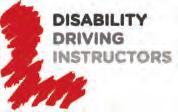

4 Ability Needs Magazine
They have over 40 vehicle adaptation products available nationwide on the Motability scheme, including a full range of hand controls, hand accelerators, person hoists, transfer plates, electric hatch openers and many more. Most recently they have launched a complete range of adaptations for disabled riders of motorbikes in collaboration with their international partners, Handytech. These adaptations are truly groundbreaking and some of which have never been seen on the UK market before.

The range of products known as ‘Freetime’, includes adaptations such as a thumb operated brake, servo-assisted original clutch, left-side accelerator & front left brake and a servo-assisted gearbox (see photo) for motorbikes. ‘Freetime’ also features a range of adaptations for UTVs, quad bikes and three wheelers. This is truly giving people living with disabilities the opportunity to live a ‘life without boundaries’, which is the BAS motto and focus of everything they do!








BAS are thrilled to be showcasing the ‘Freetime’ motorbike adaptation range at the Disability Awareness Day (DAD) in July, an event that they are extremely passionate about and have been sponsors of for many years. The event is held at Walton Hall Gardens, Warrington in July and is the world’s largest ‘not-for-profit’ voluntary-led disability exhibition. Visitors to DAD can expect to find over 200 exhibitors including equipment suppliers, transport, holidays, leisure, employment, support groups, services and more. You can find BAS in the main entertainment square, where they will have multiple demonstration vehicles showcasing their full range of car and motorbike adaptations.
BAS pride themselves on putting the needs of their customers first and on their website you will find not only the full range of products and services they offer, but also a wide array of information and advice to help people living with disabilities. This includes information on grants and funding, recommended mobility shops, charitable organisations and even how to measure a scooter/wheelchair for a hoist. You can find all of this information under the ‘Vehicle Adaptations’ section on their website. They also provide free demonstrations for their customers, helping to ensure that both the wants and needs of their customers are met.








To find out more about BAS go to www.basnw.co.uk or visit them in the entertainment square at the Disability Awareness Day in Warrington on the 16th July https://www.disabilityawarenessday.org.uk/




Ability Needs Magazine 5
“BAS are 5-star rated, award winning vehicle adaptation specialists with over 40 years’ experience in the industry; whatever your adaptation needs, BAS have you covered!”
Driving Mobility retailer training scheme for safer mobility scooter driving launches at House of Lords

WITH support from The Department for Transport, Driving Mobility has held a Westminster launch event announcing its new PWMS training scheme for mobility scooter and powered wheelchair retailers.
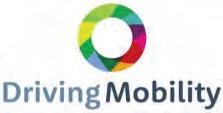

This new voluntary scheme aims to improve road safety through an approved and consistent way of providing appropriate mobility scooters or powerchairs. With the number of mobility vehicles increasing in the UK, Driving Mobility is introducing the first ever accredited training programme so products are matched more effectively with customer capabilities. Led by clinicians from the Driving Mobility assessment centres, retailers will be able to combine their new skills with their own product expertise, so consumers are able to drive more safely on
better suited products.











Driving Mobility invited scooter retailers, assessment centre managers and influential individuals from across the mobility sector to the House of Lords event. These included Baroness Tanni Grey-Thomson; Margot Shatz, Department for Transport; and Raymond Hodgkinson MBE. Speeches explaining the new PWMS Training Scheme were delivered by Tanni, Margot and finally by Edward Trewhella, Driving Mobility CEO. Feedback was positive from the guests who attended and several significant retailers registered for training on the day.
Isaac Harvey MBE, voted one of the most influential people in the UK with a disability, commented: “I had afternoon tea at the House of Lords. I never thought I would ever put that sentence together or actually do it. It honestly was just great to be in a space around other change makers and seeing this initiative launched for retailers of mobility equipment to better inform those in choosing the right product that will be safe and suitable for their individual needs.
Isaac was also joined at the launch event by fellow #Power100 disability influencer Helen Dolphin MBE. As a respected expert in accessibility and inclusion, Helen was equally supportive of the new training scheme as she explained: “For a disabled person knowing you are going to a retailer who is going to help you choose and buy a product which is most suitable for you is so important. There have been too many accidents where disabled people are using equipment that is totally unsuitable. This accreditation will help disabled people in finding an appropriate retailer who will take the time to find out about what they need so they can be safe and confident using their scooter.”
In conclusion Edward Trewhella said: “Alongside the Department for Transport, we are aware that the way people are travelling is changing especially with increased ownership of mobility scooters and powered wheelchairs. Our launch is timely and promises to enhance road safety for all through more suitable mobility vehicle provision and greater awareness of the Highway Code.”

6 Ability Needs Magazine
Edward Trewhella, CEO, Driving Mobility, formally introduces the PWMS Retailer Training scheme in the House of Lords
www.drivingmobility.org.uk











INTELLIGENCE • EMPATHY • CARE INTELLIGENCE • EMPATHY • CARE Recognised Converter
W E L C O M E T O S C O O T E R S T O R E L I M I T E D
Scooter Store Limited is an established company with over twentyfive years’ experience, which has become very popular especially with the elderly and disabled community nationwide.
The concept of a small, easy to use store for securing mobility vehicles has been extremely well received by many local authorities. Housing Associations, County, City and Borough Councils as well as charitable organisations have installed Scooter Stores throughout the country with great success; whilst thousands have been exported to Europe. This has solved storage and independence issues for many people.
In our experience we have found that many people who use mobility scooters find it very difficult getting their scooter in and out of their property without help or assistance. Storing them in living rooms and hallways is not always ideal as they take up a lot of room and can cause fire hazards.
The scooter store itself is simple and was designed in response to a demand from the public. The standard unit is 1525mm long x 1220mm wide x 1070mm high and made of 2mm steel the store comes in a green finish. Bespoke scooter stores can be manufactured to different sizes to suit your specific mobility scooter requirements. Our Scooter Stores are delivered flat packed for installation to inaccessible places and are installed by our fully trained engineers. Our scooter stores are all push button controlled and fully lockable. A socket for charging the scooter is provided within the store. The Scooter Store requires very little maintenance.
The Scooter Store is such a marvellous alternative which is secure and theft proof, and because it is so easy to use independence can be greatly improved for mobility vehicle users.
Our contact details are: Scooter Store Limited, Unit 11 Riverside Business Park, Cambridge Road, Harlow, Essex, CM20 2HE. Tel: 01279 453565. www.scooterstoreltd.com
Serenity
SENSORY BED
The Serenity Sensory Bed creates a safe and calming environment for an older child, adolescent or adult with special needs to relax and sleep in. The beds ‘zip up sides’ can be either left open or closed.

The Serenity has a lower ceiling height by design. It is high enough for an adult, adolescent or child to sit up but not to stand because most people with special needs feel safer and more relaxed in a small area.
Tough, robust and durable - The Serenity can accommodate the most lively of users and is designed so that all parts of the inner bed create a soft safe place to protect from potential harm whilst creating an appealing personal space.
Spacesaverbeds Ltd, The Fourways, Bridge Street, Amble, Northumberland NE65 0DR Tel: 01905 347 538 info@spacesaverbeds.co.uk www.spacesaverbeds.co.uk
HOME ASSESSMENT THROUGHOUT THE UK

> Available in a choice of colours
> Sleeping Area - 200 x 90cms
> Mattress Height - 40cms


> Internal Height - 100cms
> Overall Height - 140cms
> Frame – Beech wood
> Surround – Wipeable PVC
> Entry Access – One side or two sides

> Windows – Choice - sides & ends

8 Ability Needs Magazine
NEW
ONE of the great pleasures for all of us in the mobility industry is knowing that our products will enable the less able to gain extra mobility.

We are delighted to share some heart-warming messages that have arrived at Topro recently. It is a rare delight to hear when one of our rollators is adding an extra dimension and joy from some seemingly simple tasks.
















We are pleased to share the stories of two such ladies who have taken the time to write to us and share their exploits.

First let us introduce you to Mrs W who lives in the west country near Bristol. It is easier to just relate her own words, which speak volumes:




“I would like to thank you for the walker which made a great difference when I went out for the day. It means I can join in with the family when we go out.”

We also heard from Mrs B who, in her later years, is now residing in a Suffolk care home:
“I am writing to you today to confirm that the trolley has been the very best of equipment one could own. I walk round the lovely grounds daily, and I have every confidence in the Topro. I am very impressed with its clever way it folds and being able to carry small items.”
We like to think that Topro products are of the highest quality. Our factory is in Gjorvic, Norway. The Scandinavian healthcare systems are recognized as world leaders. Their health services are extremely well funded and the service to the elderly and infirm is the envy of many countries. As a result, we are proud to extol the virtues of our range of walking aids.





Our entry level product is the Hestia indoor rollator which is rich in unique features. The extra hand grips which enable users to rise from their chair, for example, are a perfect illustration of simple functional design.


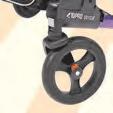
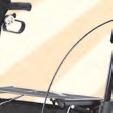
We also have our long established Original and the 5G, both excellent all-round products, ideal indoors and out. For more rugged terrain, our Olympos ATR (all terrain) rollator is extremely popular. Also in our range is the carbon Pegasus. This is currently our fastest-selling product due to its spectacular design and reassuring stability.



In addition to these we have the extraordinary Odyssé rollator which can be folded and put in its own bag. Ideal for the holiday season. In addition to these rollators, is our range of clinical products such as the Neuro. The Neuro has an advanced braking system that provides vital assistance for those with neurological issues such as Parkinsons Disease. At the top of our range there are 5 clinical walking aids: the Forearm Walker 2 and the impressive Taurus
variations. Supplied largely through the NHS, these are also available to the general public.




























Ability Needs Magazine 9
Olympos ATR
Its Summertime... Summertime is Odyssé time. Trust Topro for something completely different. Order now on: orders@topro.co.uk Or call us on 0115 846 5406
TOPRO Odyssé Travel Rollator
We a r e pr o u d o f o u r r a n g e o f r o l l a t o r s a n d h o pe f u l l y w e c a n a dd yo u t o o u r gr ow i n g a r m y o f h a ppy u s e r s
Pegasus Taurus
In January 2023 we launched our new report, sharing insight from employers and recommendations from us about how employers can become more inclusive for staff members who are deaf, have hearing loss or tinnitus.
In our second of a series of deep dives on the report with Claire Lavery, Associate Director for Employment, we look at the important role that senior leaders play in championing hearing loss at work.

The role of senior leadership
An organisation’s culture is influenced by and reflected in its senior leadership. Leaders who place value on supporting the health and wellbeing of their staff and champion disability inclusion in their workplaces know that this contributes to the success of their business. However, leaders who go beyond this to talk openly about their own personal experience of hearing loss, create a culture where staff feel safe to share their experiences and to ask for the support they need.
One organisation we spoke to achieved a significant uplift in disability disclosure rates among their staff after more visible and vocal senior role models spoke about their own lived experience. Another reported how, during an online talk about hearing loss from a senior leader, they watched as the chat bar came alive with comments from staff with a shared experience.
Positive acceptance
Many of the employers we spoke to at our roundtable discussions agreed that senior leaders have a pivotal role in modelling positive acceptance of hearing loss at work. However, hearing loss is still hidden by most senior leaders. Another organisation which participated in a roundtable cited that none of their 270 senior managers had disclosed a hearing loss, and yet we know that 1 in 8 of them are likely to have some form of hearing loss.
There is a drive in modern organisations to encourage staff to ‘bring their whole selves to work’ but unless senior leaders grasp the opportunity to lead by example, hearing loss will continue to be something that staff keep to themselves.
Career aspirations
We know that people with hearing loss are more likely to work in lower status, lower paid roles. They have also told us that they are concerned that colleagues may perceive them to be less competent and that hearing loss may hold them back from seeking more senior positions.
When senior leaders discuss their hearing loss, it
also sends a strong message to employees that hearing loss need not be a barrier to career progression.
What employers can do
In our recent survey only 32% of respondents said their organisation encourages open discussion about hearing loss. Not all organisations are large enough to have staff network groups on disability or hearing loss, but there are other ways to encourage discussion – on observance days, like World Hearing Day, or at Occupational Health events or staff meetings, or by sharing the RNID Hearing Check. You could invite RNID to come along to talk to your staff team alongside one of your senior leaders with hearing loss.
Sarah Petherbridge, who is profoundly deaf and wears hearing aids, was previously a Senior Tax Manager at EY and is now a freelance disability awareness trainer and public speaker. Here she shares her thoughts on what leaders can do to change the culture in their organisations towards becoming inclusive and welcoming.
Having an inclusive leader makes a difference – you feel safe and belonged…. Leaders set the tone for the culture and people look up to them to copy their behaviours and cultures. There are lots of steps you can take to become an inclusive leader, for example:
• Be aware of your own preferences and biases as a leader
• Be open to other people’s perspectives when decision making and encourage team members to offer new approaches and ideas in a safe environment
• Be explicit about the importance of understanding and valuing differences, such as cultural differences
• Be consistent and accountable – maintain consistent inclusive behaviours as role models and reinforce the need for accountability
• Adapt your own and others’ working styles to work with others effectively – remove any discomfort and stigmas. This will accommodate people’s disabilities so that they can work in a safe environment without fear.”
10 Ability Needs Magazine
For
information visit www.rnid.org.uk L e a d i n g b y e x a m p l e
more
Don’t you want to choose who provides your care?
Sam Hackett from Happiest at Home looks at empowering clients with choice to achieve better outcomes from care provision.
Many care companies are struggling to find staff in the UK. We hear weekly about the Care Crisis. This can cause huge problems for those looking for care. To a certain extent, people need to accept whoever is sent to their home – whether they like them or not! We hear stories of strangers turning up for calls, and we cannot understand how this would keep a client ‘safe’ and ‘cared for’.
Happiest at Home work differently, and consequently have many carers on their books ready to provide bespoke care for clients. They like to involve their clients as much as possible in choosing the right carer for them.

The team involve you in choosing the right carer for you or your loved one right from the off-set. They begin by having a very in-depth conversation with you, the more detail you give about needs and preferences, the better the match they can make for you with a fabulous carer. This can be by phone or a video call, whichever you prefer. Their client team is experienced in asking the right questions and guiding the conversation so that they find out the pertinent information.
In the next step they send you a profile of a suggested carer. They match them based on their experience, personality, hobbies, availability and location, trying to find someone who you will gel with straight away, someone who will fit around your life. The profile has a photograph of them, some information about their life, circumstances and hobbies, as well as their relevant experience.
If you wish, Happiest at Home then arrange a meet and greet, so you can meet the carer, have a cuppa with

them and discuss face to face exactly what you would like from them in terms of care, companionship, household help and anything else you require. This is either at your home, or a mutually convenient location such as a coffee shop. You can spend time chatting and getting to know each other.

If you get along well, and this is often the case, then they arrange a start date. You have at that point got a regular, dedicated carer, someone who will be around to help you out, to monitor your welfare and health, and to make sure you get the most enjoyment out of your life as possible. Happiest at Home then ensure all paperwork is in place (including DBS and insurance), and schedule all the care calls. They even provide an app which the carers use to tag in and out of all calls which allows them to accurately invoice for the care given based on GPS tracking. Ha
It can be daunting trying to find reliable home care providers for your loved ones. However, you can count on Happiest at Home to provide you with exceptional care services. They take pride in matching you to the perfect carer who meets your exact requirements and ensures that you receive prompt and reliable care every time. Their great value services – where you pay less, and their carers receive more – add to the reasons why they are the best choice for home care. Let them help you and your loved ones today.
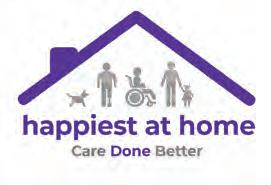
The care crisis – most people can’t find a reliable home care provider
Ability Needs Magazine 11
p pi e s t a t H o m e w o r k w i t h p r i v a t e c l i e n t s , c a s e m a n a g e r s , l o c a l a u t h o r i t i e s a n d CH C , a c c e pt i n g f u n di n g f r o m a l l
Book a free no-obligation chat with one of their home care specialists and download their free guide at wearehappiestathome.co.uk/mos, or call their client team on 0345 030 3845.
“Sight will be saved” SeeAbility welcomes rollout of free sight tests in special schools
NEWS from the government that NHS sight tests will be on offer to all pupils in their special schools from 2024/2025 has been welcomed by learning disability, autism and sight loss charity
SeeAbility as ‘life changing and sight saving’.
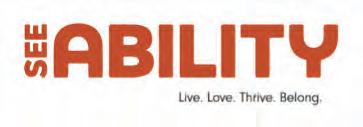
SeeAbility’s research concluded that children with learning disabilities are 28 times more likely to have a sight problem than other children, meaning half of the special school population will have a problem with their eyesight.
The NHS England Special Schools Eye Care service was set up in 2021 based on a SeeAbility recommended model of care and research evidence of high levels of unmet need from previous special school eye care services. It provides special schools with a visiting ‘one stop shop’ of sight testing and glasses dispensing as well as a user-friendly report for parents and teachers.
For many children with learning disabilities the service offers a first chance to build familiarity with NHS eye care and have sight issues treated, as parents report their children struggle to cope with appointments in the community or hospital, and to adjust to wearing glasses.
SeeAbility currently provides this eye care support in over two dozen special schools in London for 3,000 children, and champions better eye care for all adults and children with learning disabilities and autistic people.

Having introduced the NHS service to over 80 special schools up to 2022, the government has now confirmed it will be rolled out to a further 165,000 children in all special schools from 2024/25.
Minister Neil O’Brien said: “I am pleased we will be able to support sight testing for all pupils in special schools, an environment where they feel more comfortable.
“We have worked closely with NHS England, stakeholders and charities to extend this important
service and thousands of pupils will benefit as a result.
“It’s vital for all children to have access to NHS sight tests and I’m grateful to all those who helped make this possible.
“Backed by a more than £10 million investment, the extension is expected to help up to an estimated 165,000 more children and will begin from 2024/25."
SeeAbility’s CEO Lisa Hopkins said: “The announcement today means thousands of children who would have no other way of getting sight tests and glasses will now get a service in their school, and many thousands more will not have to attend hospital eye clinic appointments. It is no exaggeration to say sight will be saved and lives will be transformed.
“Thank you to everyone who has held firm for this model of care during a period of uncertainty. Today is such a significant and wonderful step forward in improving eye care for people with learning disabilities.
“We look forward to working with the government, NHS and all who have made this work possible over many years to make this newly planned rollout successful. We’ll also continue the work to improve eye care for all people with learning disabilities!”
Parent Alyson Farrell said: "My daughter Ellie benefitted from the NHS service, but she moved to a school where it hadn’t rolled out to and had to go back to hospital instead for sight tests and glasses. Hospital visits make her so anxious and are a real challenge.
“It means everything to us and I’m sure to thousands more parents to definitively know the scheme will roll out to all special schools at last.”
Perseid School in Merton is one of the schools where SeeAbility provides eye tests. Head teacher Tina Harvey said: “The difference it has made to our children is absolutely profound. Especially for the children who had previously never had an eye test but were found to need glasses.”
12 Ability Needs Magazine
F o r m o r e i n f o o n t h e Sp e c i a l S c h o o l s E y e C a r e Se r v i c e a n d a d v i c e o n e y e c a r e f o r c h i l d r e n w i t h l e a r n i n g d i s a b i l i t i e s v i s i t S e e A b i l i t y ’s w e b s i t e : w w w s e e a b i l i t y o r g / e y e - c a r e a n d o n Tw i t t e r # E q u a l R i g h t To S i g h t @s e e a b i l i t y






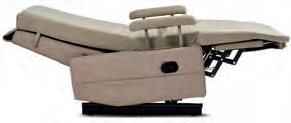





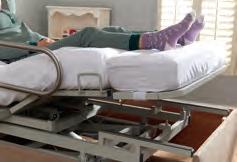
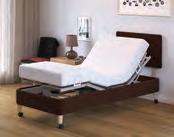
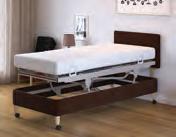
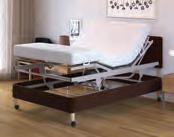
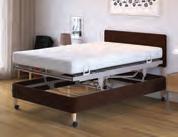



GETTINGup and down stairs is often one of the greatest challenges facing people suffering from age related disabilities. However, despite being a simple and effective method of overcoming this problem, the stairlift and through floor lift still retains a somewhat unjustified stigma and is still often the subject of much corny and clichéd humour.
The stairlift, for example, has been around for over 45 years. Naturally, over time the stairlift has changed in appearance but essentially remains simple in its function. Each year in the UK, it is estimated some 60,000 new stairlifts are installed and without doubt, the stairlift has brought freedom and relief to many thousands of elderly and disabled people over the years. However, it is still an unfortunate fact that many elderly and infirm people prolong the decision to purchase stairlifts for as long as possible. There are many reasons for this, but most often it is a misguided notion that having a stairlift is an acceptance of no longer being independent, of old age or waiting for God? Sadly the, often, fierce resistance to

acknowledging the benefits of a stairlift can have a detrimental effect upon a person and their remaining quality of life.
People should not be afraid to admit that, when older, it takes more energy to perform every day routine tasks, such as climbing the stairs for example. It is quite understandable for people born in the 1920s & 30’s, brought up before the explosion of laboursaving devices, to have a get-on and make-do attitude. Senior citizens should be proud of their past ability to endure austerity, but equally should also be unafraid to embrace modern technology for what it can now offer.
Stairlifts and through floor lifts should not be viewed as disability aids to ease one’s final days, but rather as energy saving to enjoy more in life.

Let’s not forget there is an abundance of energy saving devices that surround us today. People use dishwashers and washing machines, for example, not because they can’t clean their clothes or dishes by hand, but because it’s easier and more pleasurable to let a machine do it. In shopping malls people use the escalators and lifts rather than the stairs. Not because they can’t use the stairs but because the escalator and lift is easier and less tiring, leaving more time for the shopping pleasures. We would never equate the installation of a dishwasher or the use of an escalator as having one foot in the grave! Nor should we equate a domestic stairlift or through floor lift as such.
Despite the intense resistance in accepting stairlifts or through floor lifts, almost every person who
16 Ability Needs Magazine
Getting a stairlift or through floor lift is not the end of your life, but the beginning of a new one!
eventually gets one wishes they had done so earlier. There are many concerns from healthcare professionals, among others, that the resistance to a stairlift installation can have a detrimental effect upon an individual’s health, not to mention the increased costs to Local Authorities and the National Health Service. Excessive delays can intensify an already stressful situation and, in some cases, long delays may either exacerbate medical conditions or increase the need for residential or respite care.
Indeed, many in the stairlift industry have long felt that it has a role to play in helping to overcome this largely unwarranted stigma and over the years have been looking to address this. In part, by creating functional, yet stylish products with a promotional emphasis on enhancing lifestyle rather than merely overcoming disabilities.

Stairlift manufacturers such as Stannah Stairlifts and through floor lift manufacturers such as Terry Lifts now make a wide range of lifts to suit almost any home and staircase type; be it straight, around corners of over multiple landings. Stairlifts now come with a number of additional features, such as remote controls and powered swivel seats, and there are now even models that can be used outside. Through floor lifts are very good for people who use wheelchairs as it means they don’t need to transfer from the wheelchair to use a stairlift.
Many physicians argue that exercise is beneficial for the elderly and can help prevent the onset of some medical conditions. Without question, some exercise is better than none. However, stairs are steep and can be considerably exerting if climbed frequently, not to mention the risks of falling if unsteady, dizzy or tired. Perhaps, given the choice, it would be preferable to use a stairlift for some of the stair journeys and exert energy doing a more pleasurable, mentally stimulating and sociable exercise, such as walking in the park perhaps?
Then there is the issue of bed blocking. The healthcare industry has been aware of this for many years. Indeed, the BHTA (British Healthcare Trades Association) commissioned a report from the LSE (London School of Economics) into the cost benefits of investing in adaptive technologies. The report concluded that if investment in homecare aids and adaptations was at the heart of its adult social care reforms it could yield a potential annual saving of £1,101 per person per year. Dr Mark Spencer, Chairman of the NHS Alliance, highlighted the correlation between effective primary care (social and community care) and secondary care (hospitals) as part of the solution to an overstretched health service. The NHS Alliance also highlighted the huge cost
savings (£2.5 billion) if patients could be discharged from hospital more quickly into a social-care environment. This is very true; bed blocking is a huge problem for the NHS.
Indeed, one of the biggest causes of bed blocking is when elderly and disabled people fall and suffer serious injury. Once they have completed their treatment they can be discharged. However, in most cases the discharge can’t take place until the person’s home has been adapted. Adaptions can be anything from a simple grab rail to a stairlift or through floor lift. Home adaptations are on the whole provided by the local council social services rather than the NHS. Given bed blocking costs the NHS a lot of money and can delay other patient’s treatment while waiting for beds, once an identification of need is made and a specification prescribed, speed of delivery is vital for everyone concerned and as such needs to play a significant part of social service procurement and tendering.

Stairlifts and through floor lifts can be supplied either direct from the manufacturers or via specialist, independent suppliers. Financial support for disability access products, such as stairlifts, may also be available through various local authority grant schemes.



Ability Needs Magazine 17
home,
and community
and
about how your home can meet your needs, now and in the future? Unit 1-3, Longridge Trading Estate Knutsford, Cheshire, WA16 8PR FOR MORE INFORMATION AND A QUOTE PLEASE CALL 01565 752800 www.terrylifts.co.uk enquiries@terrylifts.co.uk Proudly designed and manufactured in Cheshire Peace of mind when buying British Installed in as little as two days Comprehensive home survey Full range of internal and external Lift solutions All lifts available to try out in our showroom
Re-connecting you with your
garden
with our range of lifts for wheelchair, standing
seated use. Thinking
ROYALNational Institute of Blind People (RNIB) is celebrating accumulating 40,000 audio books in its Talking Books library after generous donations have flooded in from publishers in recent years.
It means people with sight loss have an unrivalled choice of books they can listen to in audio formats including the very latest fiction and non-fiction titles like Empire by Conn Iggulden, In a Thousand Different Ways by Cecilia Ahern and Cross Down, the latest James Patterson blockbuster, which have been in the library from June 8.
The RNIB Studios also records books requested by customers which directly have no audio versions, allowing accessibility to works that were previously only available in print.
The milestone has been reached after top UK publishers including Penguin Random House, HarperCollins, Bloomsbury and Faber have donated their audio catalogues to RNIB for free.
Award-winning actor and narrator Jeff Harding, who has narrated the entire Jack Reacher series of novels by Lee Child and top titles including the Bourne Identity and the Da Vinci Code, has recorded numerous titles for RNIB and is backing RNIB’s library at this crucial milestone. He said: “When I started losing my hair I wasn’t being employed so much as an actor! But it’s so much fun narrating in the studio to get to play all the characters and to be my own director. Working with one of the engineers at RNIB’s Camden studio who was blind, taught me to appreciate sight loss. I used to have a great laugh with him and we talked a lot.
“The fact that RNIB can provide audio at a professional standard is wonderful and appreciated. And people with sight loss are now in control of their own reading and can request the titles they want to hear.
“There’s nothing like a good book and audio puts people with sight loss on their same parr as their sighted friends. It’s our duty as narrators to try to bring the words off the page.”
Best-selling romantic comedy author Trisha Ashley who has Myopic Macular Degeneration and whose books are available in RNIB’s library, said: “I have found the RNIB talking books library a great resource. I'm very proud my publisher Transworld, which is part of Penguin Random House, is making all their audible books accessible to the RNIB free.”
RNIB’s Senior Reading Services Manager, James Bartlett, said: “In 2015 we had a Talking Book collection of 23,000 titles; today in 2023, we have seen an incredible growth in our catalogue and can now offer an amazing 40,000 Talking Book titles for readers to enjoy. We are delighted to be able to offer so much choice and so many of the very latest, must-read titles to our readers. The generosity of the publishers has made a huge positive impact – thank you.”
RNIB produced its first audio book – or ‘Talking Book’ – in 1935. Since then, the charity has provided Talking Books in various formats to blind and partially sighted people across the UK for free, recording them in its own studios in Camden, London. In 2020, RNIB launched a new online library offering people with sight loss instant access to thousands of free books in formats they can read – including audio. The library now has 40,000 Talking Books in its collection. It was linked to Amazon devices directly when Amazon Alexa RNIB Talking Book skill launched in August 2021.

To become an RNIB Online Library member, please visit the RNIB website or call the RNIB helpline on 0303 123 9999.


26 Ability Needs Magazine
J a c k R e a c h e r n a r r a t o r e x p l a i n s w h y h e ’ s d e l i g h t e d t o r e a d f o r R N I B ’ s T a l k i n g B o o k s s e r v i c e J e f f H a r di n g
We have been designing and manufacturing equipment for people with disabilities for over 40 years throughout the United Kingdom to help them achieve an independent lifestyle in their home or anywhere they may wish to visit.
We offer free advice and assessments with no obligation quotations. If you cannot see the solution to your situation then please contact us, on 01722 717 878 as we love to talk.
DOOR OPENERS

By using our Access Control systems you can make any door accessible via our Door Opener or alternatively be alerted by someone at your door, establish who they are and the purpose of their visit and then let them in, if required via one of our many styles of Door Latch Release Systems




WINDOW/CURTAIN OPENERS
We offer one of the most comprehensive ranges of Environmental Controls, with versatile styles of Window Openers and Curtain/Blind Pullers. We can also enable control of your lighting, temperature and ambience at the push of a button from anywhere in your home.
METHODS OF CONTROL
Our equipment can be operated by a wide range of methods which are designed to improve independence and quality of life for all. We stock Transmitters, wired, wireless and ‘No Touch’ Switches and Hands Free Controls.
TELEPHONE: 01722 717 878 EMAIL: ridleyelect@netscape.net VISIT OUR NEW WEBSITE WWW.RIDLEYELECTRONICS.CO.UK
Anyone who follows me on Twitter knows that I tweet a lot about transport and more specifically about trains. Some of the time it is positive and sometimes not.
The Transport Select Committee have started looking at this as a topic which is helpful, because they bring a different level of focus to this, and the first session looked at the lived experience. I was one of those who gave evidence. In our opening comments we were asked to give a brief outline of our background and then also what we were looking for from the sessions.
My answer is always fairly similar, in that I am looking for the same miserable experience of commuting as everyone else and I am not close to that yet. The committee looked quite shocked
Tanni’s View
Baroness
Grey-Thompson DBE writes for Ability Needs

by some of the things that they were hearing, even though this is not the first time they will have seen or heard it. There is something quite powerful when someone sits in front of you and tells you the reality of what it can be like.
And then at the weekend a booked journey that I was due to take failed, and I tweeted about it. I am not going to go in to too much detail as an investigation is currently underway and I haven’t decided what further action I am going to take. I had checked the website to check whether it was an accessible station. I had booked the assistance and it was confirmed by email, and I have rarely claimed back money when I could have done under the delay repay scheme. I am refused to have tickets refunded when there has been a failed assist, and I have turned down first class tickets when there has been a fail. For me it is not about getting
20 Ability Needs Magazine
something ‘free’ back. Partly, the cost of a first class ticket to a rail company is far less than the cost if I were buying it, and partly because I am not going to take the tickets and just go away.
But I think that I am changing my view, because there is not enough movement forward. I think refund of tickets should now be the absolute bare minimum, and I am now at the point of thinking that without compensation, and evens fines, I am not sure what is going to change. I am done with being told that they are ‘really sorry’ and that it won’t happen again. Because there is always a next time.
I tweet a lot about my experiences because I want to educate the wider public on the issues that disabled people face. More often than not, if I am having an issue a non-disabled person will often offer to help. This happened twice over the weekend. I also post on social media because when you get a lot of engagement, the train companies do seem to take it more seriously. For some reason it still doesn’t feel like we are being treated as customers. Several people have told me that they have been told to not travel when it is busy, or even worse not be out.
While there may be an app to facilitate
booking, there are still failures. As a colleague said to me, an app can’t put a ramp down. And we must remember that ‘turn up and go’ (TUAG) is still an option. I do worry that being pushed towards an app means that TUAG will be forgotten. It should be noted that in Europe you are meant to book more than 48 hours in advance, not two hours. So as much as we might be frustrated we are better than other places but that also doesn’t make it OK.
The Select Committee is making a serious attempt to look at the issues and they will be tasked with making some recommendations. We were asked as a panel whether we thought the Equality and Human Rights Commission should take more of a role. My view was that the Department for Transport needed to step up. Every single Government have allowed derogations that have pushed back the date when trains will be accessible. And we haven’t even got on to other modes of transport. It is not as simple to say that things have moved on. While travelling in the Guards Van was pretty miserable, I was never left on a train.
Whatever the solutions, quite frankly disabled people deserve much better.
Crelling Harnesses Ltd.

Crelling Harnesses manufacture a full range of special needs harnesses suitable for use on all kinds of equipment including wheelchairs, buggies, scooters, shower chairs, bathing equipment, stair lifts and seats in cars, buses and aircraft etc.
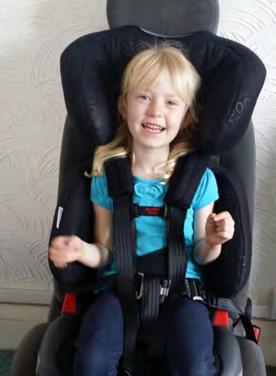
The vehicle harnesses are designed to be worn in conjunction with the existing safety belts to provide additional postural support and/or to offer a certain degree of restraint when used for those passengers with behavioural problems or learning difficulties.
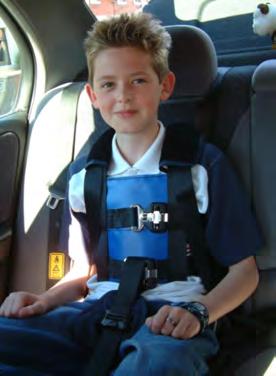
Ability Needs Magazine 21
Tel: 01253 852298 Email: info@crelling.com www.crelling.com
We make simple belts and full supportive harnesses for all kinds of special needs, including challenging behaviour
Eureka!
The National Children’s Museum in Halifax recently welcomed 500 members of The A World for a fun family day out . The A World is a non-profit organisation supporting the autistic community across the North of England.
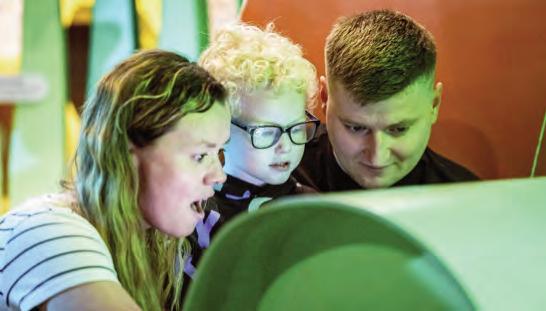
The A World organises regular autism friendly "takeover" events, which allow autistic people and their families to enjoy days out at a variety of popular destinations across the North of England, knowing they will be attending an event that will be much quieter compared to standard operating days.
Adam Howell, Director of The A World said “Eureka in Halifax is a firm favourite for many of the families who access our services and support, so it seemed like the perfect choice. To have the place to ourselves means our families are able to enjoy the day in a safe and nonjudgemental environment and encourages individuals and families to meet others who have an understanding of what life can be like”.
Michelle Emerson, Eureka! Director of Marketing & Development said “We were delighted to have The A World with us. Eureka! has always been proud of our inclusive approach to exhibitions and experiences and to see them being enjoyed by this group of families was very rewarding,
“We know how challenging it can be for neurodiverse families to enjoy days out, and the extra planning and stress that can sometimes be involved, so we’re very pleased to be able to support these families through The A World.”
About Eureka!
n e xt t o t h e m a i n r a i l w a y s t a t i o n , E u r e k a ! i s t h e U K 's o n l y n a t i o n a l c h i l d r e n 's m u s e u m . Si n c e i t o p e n e d i n 1992, E u r e k a ! h a s b r o u g h t s m i l e s t o t h e f a c e s o f m o r e t h a n 8 m i l l i o n vi s i t o r s
E u r e k a ! o p e n e d a s e c o n d a t t r a c t i o n E u r e k a ! S c i e n c e + D i s c o ve r y i n W i r r a l i n N o ve m b e r 2022
E u r e k a ! i s a c h a r i t y w h i c h i s e n t i r e l y d e p e n d e n t o n e a r n e d r e v e n u e t o s u s t a i n o p e r a t i o n s a n d e n s u r e f a m i l i e s
f r o m a l l b a c k g r o u n d s c a n b e n e f i t f r om t h e p l a y a n d l e a r n i n g o p p o r t u n i t i e s o ff e r e d . w w w.e u r e k a .o r g .u k
Limitless Travel launches new Amsterdam accessible cruise
Disabled-friendly travel specialist, Limitless Travel, has announced a new accessible cruise to Amsterdam with P&O. Setting sail in November for 5 days, this short trip is the perfect taster of the world of cruising with days at sea as well as exploration of an iconic European city.
E s co r t ed A m s t er da m c r u i s e
Visit the iconic city of Amsterdam, famed for its Golden Age history, labyrinth waterways, and liberal reputation. The city defies all stereotypes and is one of the most genuinely progressive and innovative capitals on the continent. Four nights in an accessible cabin on P&O’s Aurora cruise ship. The Aurora is equipped with a boutique cinema, an all-day buffet, an accessible swimming pool (with glass roof), steam room, sauna, spa and casino.
Priced from £1,799 per person with departure on 27th November 2023. For more information or to book visit
w w w l i m i t l e s s t r a ve l o r g / d is a bl e d -h o l id a y s /e s c o r t e da m s t e r d a m - c r u is e -w i t h -p -a n d -o
Angus Drummond, CEO comments about Limitless Travel’s latest cruise offering: “Cruises make for an ideal, accessible
holiday and can even make solo travel for disabled passengers a possibility. Pairing overseas destinations with excellent cuisine, memorable excursions and a whole host of activities on board to make days at sea a joy, this new Amsterdam cruise is the perfect taster of the world of cruising. For those booking cruises with Limitless Travel, we remove all the stress, hassle and worry from planning travel, providing the care, support and assistance required so our passengers can cruise with confidence.”
7 R ea s o n s To Cr u i s e Wi t h L i m it l es s Tr ave l :
1 Home-pick up included (first 100 miles) & priority boarding
2. Professional carers on every cruise holiday
3 Enjoy the ease of full-board cruising
4 Holiday with an accessible itinerary
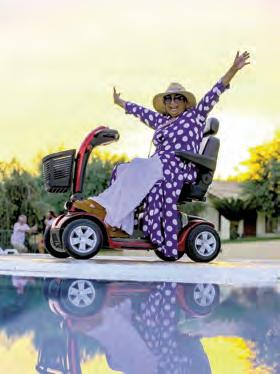
5 Five-star facilities onboard
6. Travel with like-minded people, meet new friends and share the holiday experience
7 Expert travel advice and support throughout. Limitless Travel’s holidays and experiences, designed for anybody and everybody, provide disabled people with lifechanging experiences by ensuring all their access needs are met. Run by an expert team and using fully researched and vetted, wheelchair-accessible and disabled-friendly transport and hotels along with professional, friendly carers and specialist equipment, Limitless Travel’s holidays are tailored to cater to individual’s needs.
For more information visit www.limitlesstravel.org
22 Ability Needs Magazine
B a s e d i n H a l i f a x,
E u r e k a ! W e l c o m e s T h e A W o r l d
ADD POWER TO YOUR MANUAL WHEELCHAIR
Established over 4 decades ago, Steering Developments has years of knowledge and experience in fulfilling our customers requirements.

Do you get tired quickly when using your manual wheelchair?

Are you looking for a power chair you can easily fold for transportation?


Do you want to be able to go off-road, over various terrain and to new places?
The SD Motion range of add-on systems can help with all of the above and can be tailored to suit your specific requirements. To discover how, contact our experienced team.
SDMotionAssist
Two speed assistive power for your manual wheelchair
Transform your manual wheelchair into a power-assisted one to make starting off, going uphill or over high-resistance surfaces easier, all at the push of the hand rims.


SDMotionDrive
Joystick power for your manual wheelchair
Convert your manual wheelchair into a joystick controlled electric powered chair with a range of approx 18 miles.
GET IN TOUCH
To discover more about the SD Motion range, view the technical specifcations or download the brochures please visit our website or contact us.
SDMotionTrike
Joystick power for your all terrain trike
With 26”, deep tread mountain bike wheels and a strong base, demanding terrain is no longer a barrier. A lithium-ion battery as standard allows you to travel further on a single charge, and with a range of colours available, and various tyres options, the SD Motion Trike can be customised to suit the user.
New for 2023
STEERING DEVELOPMENTS LIMITED Unit 5, Eastman Way Hemel Hempstead Hertfordshire HP2 7HF
01442 212918
sdmotion@steeringdevelopments.co.uk W: www.sdmotion.co.uk
T:
E:
www.sdmotion.co.uk
Working in partnership with
Powering your freedom with the latest mobility tech
Two energetic entrepreneurs are using their own experience of overcoming disability to offer the latest mobility tech
‘Startling, humbling, exhilarating…’ That’s how Cristian Brownlee sums up 2023 so far and there’s still another six months to go
As the faces of Adapt Ability, Cristian and his business partner Matt Walker are having a year like no other, and it’s all because of the hands-free Omeo Active Power Wheelchair (APW) they use. From starring on Dragons’ Den to taking BBC Click’s Martin Dougan for an Omeo seaside ‘drive’, the pair are definitely on a roll.

Add in Cristian winning £50k to invest after being named Disability Entrepreneur of the Year by The Stelios Philanthropic Foundation and Leonard Cheshire in May, and you see why the last six months have been ‘a blast’.
‘The highlight has been the public response we’ve received,’ Cristian reveals. ‘I often questioned why –why are we doing this? But the overwhelming support we’ve received, the smiles of freedom when people try an Omeo, the happy tears, everything… it’s so worth it.’
Regaining freedom
Adapt Ability launched in 2020 with a clear goal – to disrupt the mobility industry with cutting-edge technology that offers unparalleled freedom.

At the heart of its story lies the pair’s first-hand experience of the life-changing mobility tech they sell. Both have spinal injuries that have left them unable to walk and are enthusiastic Omeo users themselves.
In fact, Cristian was the first person in the UK to use the Omeo after spotting a ‘prototype’ of the seatsteering APW online. ‘For the very first time, with complete independence, I took my dog for a stroll in the local woodlands. I couldn’t believe what was happening… it was pure liberation,’ he recalls.
Today the all-terrain Omeo is, he says, his ’freedom’, and he wants it (and new arrival, the Adapto) to become other people’s freedom too.
Spreading the word

Hence 2023 has been about spreading the word, including at Motability’s The Big Event and July’s Disability Expo at LondonExcel.
Matt – and Adapt Ability’s ‘trialist stylist’ Darren Blight – have also been clocking up the miles on a busy schedule of Omeo ‘try me’ days, spanning the length of the UK.
‘Our ‘try me’ days have been brilliant,’ says Matt. ‘I love seing how in just five minutes people get that Omeo smile!’
This customer-first approach reflects Adapt Ability’s commitment to go the extra mile, with feedback praising the time and care the team takes.
‘We’re in a unique position to understand the difficulties people with disabilities face and the benefits our services provide,’ agrees Cristian. ‘Our ability to empathise at such complex levels gives us an edge.’
Aspiring to grow
‘Our customers are people who want to do things differently. Through innovative technology I want to show them you don’t have to stick to the highway –you can make your own paths while everybody else drives straight.’
Even better, Adapt Ability can now help customers apply for support with funding for the Omeo or Adapto through the government’s Access to Work scheme.
So what’s next? There’s certainly no sign of things slowing down. ‘We’ve just partnered with the legendary spinal cord injury charity Aspire, and we’re super excited to move into our new headquarters at the Aspire Leisure Centre in Stanmore,’ Cristian reveals.
‘The centre offers unrivalled leisure facilities for wheelchair users and we can’t wait to welcome people to try our mobility solutions there – do see our website and social channels for more. I’m excited to see where we go from here!’
24 Ability Needs Magazine
The
The world’s only hands-free, seatsteering Active Power Wheelchair –lean in the direction you want and that’s where you’ll go, slow your pace by leaning back


All-terrain capability – covers grass, gravel, forest, sand and uneven/sloping surfaces with ease
Zero degree turn – pefect for those tight spots in lifts, cafes, bars and shops
Range of more than 30 miles
Supremely comfortable ride with inbuilt, back-up safety and security features
Fits easily into the back of a hatchback, estate or SUV
Looks cool (because, yes, this matters!) – available in a range of colours and finishes
‘Our customers are people who want to do things differently. Through innovative technology I want to show them you don’t have to stick to the highway – you can make your own paths while everybody else drives straight ’
Cristian Brownlee
The Adapto – new on the block
Freedom and choice – Adapt Ability has just added a second innovative gyrobased APW to its range.
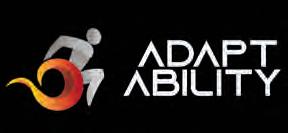
The all-terrain Adapto offers hand-steering capability and a (pretty neat) heightadjustable seat, which can be raised 14cms – perfect for catching up with family or friends in bars with higher tables/stools, cafes and shops, as well as benefitting posture and circulation.
Zero degree turn, intuitive braking system and an extensive range…. the list goes on. ‘Everyone’s needs and abilities vary,’ Cristian says. ‘The Adapto perfectly compliments our growing range of products so we can continue to help even more people achieve their mobility goals.’
Want to know more?

Ability Needs Magazine 25 Visit www.myadaptability.co.uk or scan the QR code below
Omeo difference
• • • • • • •
‘We’re in a unique position to understand first-hand the difficulties people with disabilities face and the benefits our services provide ’
Cristian Brownlee
Top Tips for Going on Holiday with a Physical Disability
AS THEsummer holidays approach, nearly half (45%) of Britons are planning to vacation abroad this year, according to independent research from Mobility Solutions Direct - who have provided the following expert tips to wheelchair and mobility scooter users on how to plan a vacation while using a mobility aid.
Whether you are taking a break to the British seaside, or going abroad, everyone has the right to enjoy their summer holidays, including people with mobility issues. However, not every wheelchair or scooter user knows the best way to plan a holiday that accommodates their disability.
• M a k e Yo u r A i r l i n e A w a r e o f Yo u r A c c e s s i b i l i t y N e e ds
You will need to give your airline information in advance about the mobility equipment you are bringing. This includes the make, model, weight and size of your wheelchair or scooter. It is also worth taking the operating manual of the equipment as this will be useful for airline employees. Let your airline know if your wheelchair is collapsible and provide details of how to assemble and disassemble it.
• C h e c k t h e A c c e s s i b i l i t y o f Yo u r D e s t i n a t i o n
Unfortunately, when it comes to accessibility, not all destinations are created equal. Use sites such as Tripadvisor or Trustpilot to find out if your desired holiday destination and lodgings are accessibility friendly for wheelchair and mobility scooter users.
• B o o k i n g A c c e s s i b l e A c c o m m o d a t i o n
When booking your accommodation, be sure to specify that you need a wheelchair or mobility scooteraccessible room. This can be done through a holiday booking site like Jet 2 Holidays or TUI, or you can contact the hotel directly via phone or email. Using an email to discuss the accommodation means you can have a written record of evidence in case the hotel fails to deliver on its promise.
• H i r e a W h e e l c h a i r A c c e s s i b l e Ve h i c l e
It is against the law for taxi and minicab operators not to supply an accessible vehicle. By hiring a wheelchair or mobility scooter-friendly taxi service to take you to and from the airport, you will be able to carry all of your luggage and mobility aid in one trip, offering comfort and a stress-free journey.
• B r i n g a P o r t a bl e R a m p o n H o l i da y
A portable ramp provides those with mobility issues with independence when accessing hotels, restaurants and tourist attractions. The CAA say you can carry up to two mobility items free of charge. It is also worth contacting the airline you are with to let them know that you require these mobility aids.
• Ge t Tr a v e l I n s u r a n c e T h a t C a n C o v e r P r e -e xi s t i n g M e d i c a l C o n d i t i o n s
If you have a pre-existing medical condition, such as a mobility issue that requires an aid like a wheelchair, it is best to get travel insurance. Make sure that your travel insurance can cover medical expenses and getting you home if you’re injured or fall ill.
• I n s u r a n c e C a n C o v e r L o s t o r D a m a g e d I t e m s
Travel insurance can cover costs for lost or damaged items including your mobility aids. Airlines hold responsibility for any harm caused to mobility equipment, although the compensation may be limited to around £1,300. It is advised to consider obtaining additional insurance coverage.
• P a c k L i g h t
If you are bringing heavy mobility solutions like a portable ramp, wheelchair or mobility scooter, packing a lighter suitcase or travel bag will make it easier for you to get around. Remember that most airlines have a carry-on weight limit of 40 pounds.”
Mobility Solutions Direct specialise in providing a wide range of mobility aids and has a plethora of experience in advising on mobility options.
For more information visit www.mobilitysolutionsdirect.com
26 Ability Needs Magazine
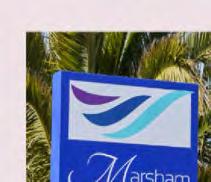













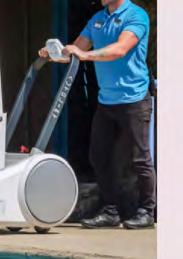




















10 Ability Needs Magazine
Eddie
Charity begins at home

Hello again, I had a birthday recently. I have had quite of few of these, so please understand if I don`t recall the precise number. I only mention this because of a card I received from my 6year-old grandson Joseph. His was a handsome handmade card, and it contained a particularly unusual greeting. He said, “I hope you have a spectacular day.” His ultra positive encouragement made me smile, but then Joesph regularly makes us all smile. He also reminded me that life should be enjoyed even when everything might seem to be less than joyful.

We are living in difficult times. Good news is hard to find. Our list of woes is formidable. We have a “cost of living crisis”, striking nurses, striking railway men, potholes in the roads, an NHS in strife, a war in Europe and, we are told, an impending climate tragedy. Apart from all that, everything is going well!
Life has taught me that we will all experience some troublesome events. The challenge is, of course, how we cope with them. There is always inspiration at hand.
It was the King James bible that first coined the expression “from the mouths of babes etc” and our Joseph`s good wishes proved the point and certainly jogged my senses. I did have a spectacular day, despite the impending doom and I am now motivating myself into a positive mindset.
There are many reminders of our present troubles
everywhere. The newspapers, TV, and radio bombard us relentlessly and it sometimes feels as though there is no escape. Take a trip to your local high street and you will see a forlorn display of empty shops and other premises. Town centres look far from vibrant these days. It is notable that we now see “charity shops” growing in number amongst the empty ones. These shops thrive through helpful commercial arrangements, but largely through the diligence and dedication given freely in every corner of our country by the volunteers who work there
We must acknowledge that millions of us are currently finding life pretty stressful. The old and frail are, in particular, enduring immensely difficult problems. If, however, we look at our world from a slightly different perspective, we can still take a slightly more optimistic view. There are endless examples of kindness and generosity to be found on
Eddie Peacock has worked in the mobility industry for “rather a long time”. He enjoyed a challenging career having started by selling wheelchairs, scooters and stairlifts for Sunrise Medical, eventually working his way to the position of UK sales manager. After a period as a self-employed consultant he was invited to manage movingpeople.net, then Handicare Ltd, in

28 Ability Needs Magazine D H W
Peacock
a daily basis.
Despite the doom and gloom, nothing appears to blunt the generous nature of the average Briton. Do you know how many people give their time and energy freely to charities across the UK? I imagine you are reading this sitting down, which is just as well, because it is estimated that approximately 4.3 million people work for nothing other than a desire for social rather than commercial wealth*. I read that, incredibly, this represents around a third of the UK workforce. When these numbers are analysed, a proportion of these good folk are indeed carers who are looking after sick or disabled friends or relatives. According to the Centre for Care at the University of Sheffield, around 12,000 people become unpaid carers every day in the UK.
Here at Ability Needs, we are obviously aware of the challenges facing the less able and older cohort of the population. As we often communicate the fascinating development of new products and trends, it strikes me that we should all express a deep gratitude to these dedicated folk who are happy to help others.
nas ctudropwenfotnem detcaidedseehtoteduti
This is not a partisan political statement, but my view is that, however poorly our government performs (sorry Rishi), nothing will thwart the generosity and good nature of the British population. This should not be taken advantage of, but it is a powerful reflection of the simple goodness that surrounds us.
mpoleved tragpeed onthgimtI noitalupop ahtmixam cenceonni
It might not make big news to analyse and praise this heart-warming aspect of the population of the UK. We could be forgiven by thinking that the media flourishes on the maxim that “good news is no news”! This takes me back to our Joseph and the innocence behind his birthday message.
htems keristtis,dnretd otyppahreaohwk lofd
hsrepxelladluoshewta rs.ehtopleh
development of new products and trends, it strikes me that we deep gratitude to these dedicated folk who are happy to help
anaots wengibkeamto bdlucoK.Uehtfon wenons is wendoo“gta emyadhrtibs ihdnihebce
It might be very difficult, but we should all try to realise that nothing, even an economic slump, lasts forever. We should not lose focus on the future. We could all make the extra effort to help those around us who are most in need.
ehs ihtseirapdnaseyla htgnkinihtybnevirgofeb ck abems keats ihTs”!w .egssae
eshriuolfaidemehttahs ehtdnahpseJor uootck
It might not make big news to analyse and praise this heart-warming population of the UK. We could be forgiven by thinking that maxim that “good news is no news”! This takes me back to our innocence behind his birthday message.
ebthgimtI stal,pmusl oeratxe
shewtub,tlcuiidr yeve ndluosheWr.evreofs st dnuroaseohtplehotrt
Whether we just put that extra tin of baked beans in the supermarket food bank or take the time to visit that older or disabled person round the corner, everything helps. It helps them, obviously, but it is surprising how uplifting the experience is for us.

This voluntary army is sometimes known as the third sector and whilst there are no precise records available, it is known that there are over 165,000 voluntary organisations in the UK utilising the generosity of those 4.3 million good souls. It is further estimated ** that if people were to be paid at the National Living Wage, it would reflect a sum of £3 billion! As our Joseph would say that is truly “spectacular”.
wr ehtehW otemiteht vbo,meht
nitratxetahttupstujew saidr or edlotahttsiivo ,ysluoiv butnsirirpsus iti
the UK. In recent years he held the post of Marketing Manager for Mobility which also involved supporting and working with the BHTA.
He has now retired and is looking forward to finding the time to perform useful tasks in the industry, playing drums in a blues band, travelling and most important, being silly with his grandchildren.
We read regularly of those who are “living the dream”. Those who are doing so will, by nature, display a positive approach to their lives. Everyone experiences troublesome moments. Some are huge and some are relatively trivial, but positivity always helps in the battle. Like those wonderful charity volunteers who seek no selfacknowledgement or praise, spreading positivity by word or deed will always win through.
dluos hhtseilareotrytlla tufehtnos cuofseolton eennistomreaohws u ehtnis naebdkeabfon coehtdnuronrsoepdelb pxeehtgnitfilpuwohgn
coenaneve,gnihtontah keamlladlucoeW.reut .de k nabdooftrkearmepsu s.plehgnihtryever,ernco s.ur ofs icenerie
It might be very difficult, but we should all try to realise that nothing, slump, lasts forever. We should not lose focus on the future. extra effort to help those around us who are most in need. Whether we just put that extra tin of baked beans in the supermarket the time to visit that older or disabled person round the corner, them, obviously, but it is surprising how uplifting the experience
So, make sure you have a spectacular day yourself. Otherwise, I will tell Joseph.
redare foyrlalugr ea ohwseoht T”.maredehtgnivi“lrea sogniodreaohwseoh reutan,sp s.tnemom .elttabeht

We read regularly of those who are “living the dream”. Those nature, display a positive approach to their lives. Everyone experiences moments. Some are huge and some are relatively trivial, but the battle. Like those wonderful charity volunteers who seek or praise, spreading positivity by word or deed will always win
To contact Eddie send an email to abilityneeds@btinternet.com. or write to him at Ability Needs, 7 Montgomerie Terrace, Ayr, KA7 1JL
So, make sure you have a spectacular day yourself. Otherwise, !"#$%&'()*+)$,&-.&'()/01&'#22343,&567()+&8$9:3719.%&
Ability Needs Magazine 29
* To n y C h a p m a n , S t C h a d ` s C o l l e g e , D u r h a m U n i v e r s i t y * * N C VO C i v i l So c i e t y A l m a n a c 2 0 22
**NCVO Civil Society Almanac 2022
seirapro, keam,So !()*+ '"#$% **v Ci yg yals
sodnaeguhreaemSos. tkeiL
actespaevahuoyresu 32#2'1.-)$,( )*+ + )(756 2canaAeicoS g oryeEvs.evilr iehtotch reaems
ordow htO.flrseuoyyadr alcua %.93:98$+ soelburots
,h
e-g s yh w. seirweh,h vC i
pch aroppaevitsiopa
.ch lurfednowseoh ybytivitsiopgnidaresp
oy levitalr el aivrit seohwrs eetnulovytriach yawlalliwdeedr
ceneriepxeen
s yawlaytivitsioptub flseonk es
We’re making it easier to search for scooters and powered wheelchairs on the Motability Scheme
On the Motability Scheme website, you can see all the mobility products that are currently available. You can find them by clicking on the ‘Find a vehicle’ tab in our website’s navigation menu, and then scrolling down and selecting the type of vehicles or products you’re interested in seeing, such as scooters or powered wheelchairs.
We recently improved this part of the site so that it’s even easier for you to browse through products and find one that’s right for you. Our updated search tools are one of many new improvements across our website.
The biggest difference is that there are now two separate tools to search for mobility products on our site – one for scooters and another for powered wheelchairs. Previously, these searches were combined into one, but we’ve split them out so that you can find what you’re looking for more easily. Plus, there are new features to help you to choose the right product for you.
You’ll notice that we’ve simplified the names of the
product types we offer, so that it’s easier for you to know what your options are. You can now browse by Transportable, Foldable, Pavement or Road-legal options when choosing a scooter.
When you search for a scooter, you’ll see that the results are grouped by make and model, so it’s easier to see what’s available. We’ve also introduced some new filters to help you narrow down your search.
If you’re looking for a powered wheelchair, you can now browse by Standard or Configurable. Just like with the new scooter search, you’ll see that the results are grouped by make and model, so that they’re easier to scroll through. You can also use a range of filters (including some brand-new ones) to narrow down your search.
Another thing you should know is that with both new searches, you can add a product to your ‘favourites’ and come back to it at a later point. This helps you compare your options more easily, before deciding which product is right for you. Your favourites will only be saved on the device you’re browsing on, rather than across all of your devices.
For more information visit www.motability.co.uk/whats-available/scooters-wheelchairs
The‘What Matters’ survey released by the Spinal Injuries Association, which looked at almost 1000 responses from spinal cord injured people, found that the majority of respondents have stretched themselves to the limit this winter by diving into savings or running up huge debt. With benefits falling short, some have been forced to turn to food banks and warm spaces with one so desperate that they admitted to resorting to stealing food from shops.
Despite the news that energy costs are coming down in the short term, the future is uncertain with overall energy costs still much higher. Many have real concerns that they have no real way of increasing their income to absorb any additional costs that next winter will inevitably bring.

Spinal cord injury brings mobility issues and in many cases paralysis below the point of injury but there are many hidden effects such as an inability to regulate body temperature. For a spinal cord injured person simply switching off the heating is not a safe option, and some have to use additional equipment such as hoists or stairlifts which take on even more electricity.
Many reported that the cold adversely affects their
pain levels and their ability to walk with some struggling to actually move around their own home. Some resorted to wearing ski clothes indoors or wrapping themselves in blankets and duvets and staying in bed all day, rather than turning on the heating.
Nik Hartley OBE, CEO of Spinal Injuries Association said: “We’re shocked and saddened by what we’ve learnt. It remains clear from our responses that spinal cord injured people are being failed. Failed by a health and social care system in crisis and failed by a lack of coordination and financial support when they really need it. We will continue to support our members to ensure that they are receiving all of the discounts to which they are entitled and know where to find any additional help."
For information and support telephone the Support Line: 0800 980 0501
30 Ability Needs Magazine
8 out of 10 spinal cord injured people are concerned that their financial situation won’t allow them to survive next winter
Nik Hartley OBE
THE WORLD'S LIGHTEST GENUINE FOUR WHEEL MOBILITY SCOOTER

• Premium build quality
• Lightweight
• 8” PU wheels, solid front and back
• Maximum weight capacity 125kg

• 120W brushless motor
• Maximum speed 7km/h

• Frame made from magnesium
Weighs only 14.7kg!
CONTACT US TODAY ON 0808 102 0227 WWW.MONARCHMOBILITY.COM
Excluding battery
INDUSTRY INSIGHT
Angus Long

Should we curtail the drive for increased Artificial Intelligence?

RE C E N T LY i t h a s b e e n r e p o r t e d t h a t a l a r g e n u m b e r o f w o r l d- r e n o w n e d t e c h e xp e r t s , i n c l u d i n g Tw i t t e r b o s s E l o n M u s k , A p p l e c o - f o u n d e r St e v e Wo z n i a k a n d E l i e z e r Yu d k o w s k y, c o - f o u n d e r o f t h e M a c h i n e I n t e l l i g e n c e R e s e a r c h I n s t i t u t e , h a ve w a r n e d o f t h e t h r e a t t o h u m a n i t y o f t h e e v e r i n c r e a s i n g d r i v e b y t e c h g i a n t s r a c i n g t o d e ve l o p e ve r m o r e a d va n c e d a r t i f i c i a l i n t e l l i g e n c e ( A I ) So w o r r i e d a r e t h e s e t e c h e xp e r t s t h a t t h e y b e l i e ve i f t h e r e i s n o t a n i m m e d i a t e h a l t , t h e y g e n u i n e l y b e l i e v e , t h a t i f w e b u i l d A I s m a r t e r t h a n w e a r e , t h e l i k e l y r e s u l t w i l l b e t h e e xt i n c t i o n o f h u m a n i t y. Su c h s c e n a r i o s h a v e b e e n t h e s u b j e c t o f m a n y s c i e n c e f i c t i o n m o v i e s o ve r t h e ye a r s , w i t h t h e A r n o l d Sc h w a r z e n e g g e r Te r m i n a t o r f i l m s a m o n g t h e m o s t w e l l - k n o w n .
Technology is a catch-all term to describe advancements, improved processes, efficiency, ease or speed of things we used to do. If you were born in the 30’s or 40’s the technological gadgetry we all take for granted today must have seemed ‘light-years’ away back then.
It is human nature to evolve and advance and there are many great examples of technological advances that offer fantastic benefits, none more so than in healthcare. Where would we be
without X-Rays, ventilators, defibrillators and hearing aids?

Every new way of doing something offers benefits and drawbacks and sometimes it can lead to unintended consequences. So, in that respect, technology can be a fiend as well as a friend.
It has never been easier to innovate and push technological advancements to increasingly staggering levels. However, at times it seems we are creating new technological advancements not because we fundamentally need to, but simply because we can. Too often a gadget or mechanism is created first and then a use for it fashioned later rather than the other way round. As such, we’ve become accustomed, if not indoctrinated, into thinking that the only solution to a problem, issue or improvement is a new technological gizmo, app or electronic process.
Given the relative ease and speed of development modern technology offers, there is generally a rapid uptake which makes it all the more frustrating when things eventually fail. As such, perhaps we ought to pause sometimes and ask if the positives really do outweigh the negatives, for society as a whole, with some of the innovation we’ve introduced. In many cases, the real beneficiaries are institutions rather than
32 Ability Needs Magazine
the public. In my view, a good example of that is the drive to online shopping, banking and virtual customer service. And let’s not forget the drive for evermore self-service supermarket shopping. But do we really want that?


Purposeful vocation is an intrinsic component of a stable society, and more jobs are being lost to machines and technology every day.
Where do we draw the line? Today 7.3 billion people inhabit the planet and the world’s population is predicted to rise to around 11 billion by the year 2100. That’s a lot of people competing with technology for meaningful employment. There is so much more to life than efficiencies and cost savings. So how much time are we really saving at the self-service till and is it really more valuable than the job of the checkout staff?
If you think about it, in many service based industries now, we don’t actually get a choice anymore and people are compelled, cajoled or threatened with financial penalties into accepting the ‘new way’ of doing things whether we like it or not. However, when the technology fails or is ‘hijacked’, in some cases society can literally grind to a halt. But it’s not just when the technology fails; do we really want an increasingly faceless society where social interaction is replaced by machines, gadgets and robots?
We are already becoming accustomed to sophisticated AI technology in our lives with the increasing advancement of driverless road
vehicles, trains, planes and ships. In healthcare there are companies now developing robotic-assisted surgery, which in time will, no doubt, lead to full robotic surgery.
But even on a smaller, day-today scale, intrusive AI is seeping into our lives with the likes of everyday equipment and gadgets. Many smartphone apps access the activity we do and listen into conversations and, in turn, analyse that information to target us with adverts. So too, many smart TV’s and interactive devices like Alexa.
We even now have artistic AI that can write essays and books, so not long before AI writes music, plays and it’s already beginning to replace actors and musicians. The virtual ABBA concerts are a good example.
The likes of Musk and his tech colleagues accept the technology and AI capabilities are already advancing to the stage that it won’t be too long before we have robots doing hirisk activities and Robocop will become a reality. Along with robotic firefighters, soldiers and Air Sea rescue.
They worry too, that a sufficiently intelligent AI won’t stay confined to computers for long. In today’s world, you can email DNA strings to laboratories that will produce proteins on demand, allowing an AI initially confined to the internet to build artificial life forms or bootstrap straight to postbiological molecular manufacturing. They genuinely worry that if somebody builds a too-powerful AI, under present conditions, we can expect the end of the human species and all biological life on Earth dies shortly thereafter. Scary stuff indeed.
 Angus Long is owner of Writers4U Ltd
Angus Long is owner of Writers4U Ltd
Ability Needs Magazine 33
Cloud Technology Answer to NHS Crisis
Britons have been told that the gruelling scramble for an 8 am doctor's appointment will soon be a thing of the past thanks to digital telephony software.
Experts from TelephoneSystems.Cloud have hailed the Department for Health and Social Care's (DHSC) decision to give £240 million in funding to GP practices to adopt modern technologies and conquer the NHS Crisis.
Since the pandemic ended and restrictions were lifted, GP surgeries nationwide have been in turmoil, with patients struggling to contact their general practice and missing out on the care they need. While the pandemic accelerated technological change across the broader business sectors, until now, the NHS has lagged dangerously behind.
Any treatment on the NHS usually begins with a trip to the local GP practice followed by a faceto-face appointment, but COVID-19 highlighted the need for change when the system could not cope with a transition to remote care.
The disruption of ordinary care resulted in massive backlogs and longer patient waits. Over 7.33 million people are now on NHS waiting lists for consultant-led elective care, and the numbers are only growing.
Before the pandemic, in February 2020, there were 4.43 million people on the waiting list for care, and experts say it will take years to clear the growing backlog.
The NHS England’s access to a primary care recovery plan, recently unveiled by the government, will see practices given £240 million to take up the latest technology and replace the old, outdated, analogue phones with modern systems. The NHS also published changes to the GP Contracts for 2023/2024, which states that the cloud-based-telephone National Framework will be mandatory and only cloud-based solutions will be supported by the end of 2025.


It is hoped that the government's commitment to the funding of technology will empower patients to manage their own care using the new tools so they aren’t asked to call back another day to book appointments, and so they know how their care will be managed on the day.
Juliet Moran, from TelephoneSystems.Cloud said: “The medical crisis has driven a need to implement changes in the NHS and GP phone systems are no exception.
“Modern technologies and tools like cloud data and digital telephony will now enhance care and combat primary care issues. These technological advances will offer significant opportunities to improve healthcare to scale, deliver quicker results and offer seamless services.
“As practices are able to use the technology to receive, navigate, access, and respond to requests, patients will benefit from rapid assessments and responses which will cut wait times, capacity, and the dreaded 8 am rush. The bottom line is that technology is constantly evolving, and will not wait for the NHS to catch up, so this funding is vital to modernise and improve services and accessibility, especially in primary care.
“The success of markets like cloud computing since the pandemic has demonstrated that technology can improve efficiency and productivity, and it is excellent to know that the NHS will soon enjoy its benefits.
“It is great to see that the government has recognised the role of technology in providing patient satisfaction and delivering on cutting down waiting lists.”
To find out more about new technology and cloud-based systems, visit: www.telephonesystems.cloud/how-cloud-phones-work/
34 Ability Needs Magazine
I m a g e C r e d i t : Sh u t t e r St o c k
Breaking Down Barriers for those with Invisible Disabilities
WHEN it comes to physical impairments, you are more likely to be aware that a person has a disability, especially if they are using a wheelchair, an assistive device, or a hearing aid. This can make it easier to understand the challenges they face and find ways to support them. But the reality is that 80% of individuals living with a disability have an ‘invisible’ one, meaning that it is less obvious to the eye, cannot be spotted from the outside, and is more tricky to comprehend.
Here, we explore some of the most common hidden disabilities, highlighting what you can do to be more inclusive and how to offer people assistance.
According to Mind UK, one person in four is affected by mental health problems of some kind in England each year. Mental health conditions can include anxiety, depression, bipolar disorder and post-traumatic stress disorder (PTSD).
Being available, calm, and patient, as well as giving them the reassurance they need are all steps you can take to mitigate the symptoms of those suffering from anxiety.
r n i n g di s a b i l i t i e s
Learning disabilities, such as dyslexia, dyscalculia, and dyspraxia, are also invisible conditions that can have a significant impact on people’s everyday life. Someone affected by dyslexia, for instance, may have a harder time developing their reading and writing skills. Not only that, but they may also struggle with information processing and with remembering what they see and hear.
If you have a colleague who may take more time to read, write, and digest content at work, there are several actions you can take. Consider sticking to the same format for forms and paperwork, as it will make it easier for them to enter or find information. Also, ahead of meetings, provide your team member with the relevant documents and key points in advance.
N e u r o l o g i c a l c o n di t i o n s
Some neurological conditions can also be classed as invisible disabilities. This could be the case for illnesses such as Parkinson’s disease, multiple sclerosis, and epilepsy, which may not be easy to spot at first from the outside.
One way you can help people with epilepsy is to
check in with them and ask if they need any assistance or advice such as ensuring they are getting enough sleep at night. Sleep deprivation can be a significant seizure trigger, so it is crucial to enjoy as much quality rest as possible.
Chronic pain can be extremely debilitating and have a huge influence on somebody’s life. That said, it is not always easy to spot, meaning that people can live with arthritis, fibromyalgia, or serious back pain without anyone realising.
If you know someone with arthritis, there are simple, considerate things you can do to help. If you are out for a meal, something as quick and easy as opening a bottle or can could spare them from a challenging, painful activity.
H o w t o be m o r e i n c l u s i ve o n t h e w h o l e
What can you do to be more mindful of people who live with invisible disabilities? The truth is that you can never tell who has one for certain. So, we have put together a few tips to help you be more inclusive whether you’re aware of someone’s hidden condition or not:
• D o n ’t e x pe c t p e o p l e t o r e ve a l o r p r o v e t h e i r di s a bi l i t y – Not everyone feels comfortable disclosing their invisible condition – and that is totally understandable.
• B e a g o o d l i s t e n e r w h e n t h e y c o n f i d e i n y o u – If someone decides to open up and talk to you, reply without judgement and show your appreciation.
• K n o w h o w t o r e s po n d i f yo u s a y t h e ‘w r o n g ’ t h i n g – Sometimes, you may say or react in a way that comes across as inconsiderate. Mistakes can happen, but make sure to own what you said by promising to be better next time. Don’t cause a scene nor downplay what you said to avoid awkwardness. Instead, accept responsibility and learn from it.
Whether at work or within our family and social circle, there are many people who coexist with hidden illnesses. But by educating ourselves and broadening our understanding of these conditions, we can actively break down barriers for all those living with invisible disabilities.
Ability Needs Magazine 35
I n t h e U K a l o n e , t h e r e a r e a r o u n d 14.5 m i l l i o n p e o p l e w h o l i v e w i t h a d i s a b i l i t y.
e n t a l h
M
e a l t h c o n d i t i o n s
e a
L
C h r o n i c p a i n
Danielle enjoys ‘La Dolce Vita’ in stunning Venice with the help of her eFOLDi scooter


Danielle, 43 from Colchester, described her recent trip to the gorgeous city of Venice, Italy as “truly incredible” but she wouldn’t have been able to enjoy this unique travel experience without her ‘travel-friendly’ scooter. Following an accident in her mid-teens, Danielle finds walking long distances a real struggle and her condition can cause chronic pain. Despite these challenges, however, Danielle is determined to remain independent, because travel is her real passion, and she wants to enjoy the freedom to explore with both her family and friends.
Travelling in the UK and overseas can be challenging, both physically and emotionally, but having a portable scooter can make a massive difference. Danielle commented, “Because my eFOLDi scooter folds up so quickly and easily, it can be simply stowed away in the hold of a plane, in the boot of a car or in the luggage rack on a train. It only takes a few seconds to fold or unfold, and weighs only 17kg, without the battery.



“When me and my husband recently travelled to Venice, I used my scooter to get around the airport, to check-in for my flight, to get a bite to eat and check out the shops in the main shopping area. As we travelled light and only took cabin luggage, I could drive my scooter whilst pulling along my baggage at the same time, which was a great help. When the call came for our British Airways flight, I was even able to drive my scooter right up to the plane door. The cabin staff made sure my scooter then went in the hold, neatly folded so I could collect it when we landed. My scooter uses a removable lithium-ion battery which means it’s also fully airline compliant.”
The wider region of Venice and Giudecca is connected by more than 430 bridges, but thanks to a network of ramps and water buses it claims to be more than 70% accessible. The local government in Venice as well as local businesses in the city have worked hard to help improve levels of accessibility in recent years. This includes the vast majority of museums in Venice which are now classified as accessible, which is fairly impressive given that many of those museums are located in buildings constructed many hundreds of years ago.
Danielle remarked, “You can end up walking for miles to see all the sites and I just couldn't have done that without my scooter. The water buses can be used if you do need some assistance, and they didn’t mind taking my scooter on board. Some ramps did require a little planning here and there, to ensure I had enough of a run up and that there were no pedestrians obstructing the way. But, other than that, my eFOLDi Explorer scooter coped really well. It could also fit down all the narrow alleyways, and it’s very easy to manoeuvre, although it’s important to maintain your balance on any uneven surfaces.
“All in all, I have to say, Venice is beautiful and such a fantastic city to visit. My husband and I had a great time – it really is a stunning holiday destination. I would certainly recommend Venice to any other scooter users. With a little bit of planning and a companion to support you, should you need it, anything is possible.”
36 Ability Needs Magazine Visit www.efoldi.com or call 0800 622 6876 to arrange a FREE, no-obligation home demonstration today









Supported by: Proud to be part of: ShopMobility UK co-ordinates a network of local ShopMobility centres which hire mobility scooters, powerchairs and wheelchairs for everyone, of all ages, to enjoy independence. Be free. www.shopmobilityuk.org Find your nearest centre at:
New partnership with Stroke Association announced by Surrey disability charity QEF



DISABILITYcharity Queen Elizabeth's Foundation for Disabled People (QEF) has announced a new partnership with the Stroke Association in Surrey for clients of their Care and Rehabilitation Centre. The partnership will see stroke clients on the East Surrey NHS stroke pathway receive one to one support with their transition home, helping to reduce anxiety and increase connections with their local community services.
Returning home after a life changing event such as a stroke can be a daunting time for an individual and their family. A person may be left with acquired disabilities which fundamentally change their life and what they are able to do, some of which may be hidden and hard to explain to loved ones and friends.
The expert teams at QEF's Care and Rehabilitation Centre support people straight from hospital with neuro rehabilitation and nursing care to recover as many core skills as possible. This often includes regaining the use of limbs affected by the stroke - often down one side of
the body, possibly learning to walk again and regaining the ability to swallow safely, speak and communicate with others. Their neuro rehabilitation team include physiotherapists, speech and language and occupational therapists, as well as clinical psychologists.
The psychologists at QEF's Care and Rehabilitation Centre work with a stroke patient and their family or care giver to help people adjust to the changes in all their lives and find a new way forward. This new partnership with the Stroke Association will be an important part of supporting people to find this new way forward.
As part of the NHS Stroke Pathway, people referred to QEF from East Surrey Hospital will meet with a Stroke Association Coordinator on a one-to-one basis prior to their discharge home. The aim is to ease the anxiety and stress over discharge for both the individual and their carers/ family members, as well as opening important channels of communication. Support from the Stroke Association will then continue for up to a year post discharge to help people adapt to their new normal and achieve their personal goals.
More information on the services at QEF's Care and Rehabilitation Centre is available at www.qef.org.uk/service/crc and for information on the Stroke Association's services in Surrey visit www.stroke.org.uk/finding-support/support-services
During 2024, Louise Naylor, Paul Moore and Emma Way, who all have limited physical ability, will cycle more than 1200 miles over five legs averaging 55 miles per day. They will visit the twelve National Spinal Cord Injury Rehabilitation Centres throughout the UK and Ireland to raise awareness and funds for Cauda Equina Syndrome (CES).
To support the success of the challenge, sponsors are needed to reduce costs and ensure maximum fundraising for CESCI.

Sponsors can support the event in many ways from financial sponsorship to equipment. All offers will be gratefully appreciated. Premium event sponsor packages are available.
With the support of our sponsors, all public fundraising, open in 2024, will go straight to those in the community living with Cauda Equina Syndrome.
For more details and information email backaround2024@gmail.com
38 Ability Needs Magazine
B A C K A R O U N D 2 0 2 4
Air4All and Delta Flight Products join forces to…. Turn WheelchAIRtravel into a reality
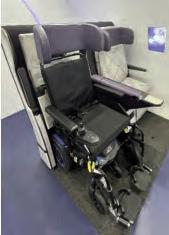


THOSE of you the read this column regularly know that I am one third of the Air4All consortium, we are dedicated to making accessibility in air travel inside the cabin more dignified and safer. We have now joined forces with the US based Delta Flight Products; thus, we have a US and UK collaboration, exactly the amalgamation needed to bring this to inception. Added to this we have partnered with Sunrise Medical, one of the biggest manufacturers of a broad spectrum of wheelchairs.
The prototype was unveiled a few weeks ago at Hamburg Aircraft Interiors Show on the 6th June. As the show opened, I had my bar very low, I simply had never done anything like this before. For three solid days we were inundated with Airlines and the associated supply chain, all in awe of what we have created.
Also queuing up were (literally) the worlds media eager for a demonstration and interviews, it was described as ‘The Star of the Show’ by aviation journalist Seth Miller.
So, what does this mean to those like my two children who use PWC’s. I can say that this will not happen tomorrow, we now take the prototype towards certification which can take anything from 18 months to two years, there is a lot that can happen in between so watch this space.
Social media platforms all lit up with the news that travelling by air in a PWC took a step closer to reality. As to be expected there were numerous questions in those posts, one that needs answering was the price of a ticket. This is very much still on the table, however I would suggest that it would be no more than the price of a standard economy seat –but I am pushing for something better. But the post below gives an indication from the community what this means.
“The airline that does this gets all my money and loyalty
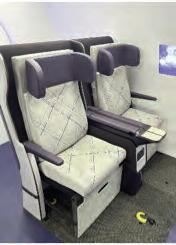
There where hundreds of questions around the type of wheelchair that will be allowed on the aircraft. Once again everything is on the table, we are however using a WC19 compliant PWC for all the testing as this has many attributes needed to fly inside a pressurised cabin.
This has not been designed for one airline, it has been designed for EVERY airline, more importantly the team will be looking at different cabin layouts and classes. This is the start of that true “door to door” journey, something the community has yearned for. It also brings airlines a step closer to being inclusive.

Ability Needs Magazine 39
”
Team BRIT begins European racing campaign
Team BRIT has announced its entry into a new, major European racing championship
Team BRIT is the only competitive alldisabled racing team in the world and has developed innovative hand control technology to enable its drivers to compete equally with able bodied drivers.
This year, its nine drivers are competing across four championships, each at different stages of their racing journeys.
In May, the team announced a change to its planned 2023 season, with an entry into the inaugural McLaren Trophy Series, Europe.
Drivers Bobby Trundley and Aaron Morgan will represent the team, moving over from the British GT Championship. The pair made history as the first ever all-disabled team to compete in the championship last year, finishing 2nd in the Pro-Am GT4 class.
Since June this year, Aaron and Bobby have been racing in McLaren’s all-new single-make championship, which will see the team compete on a global stage in 10 races across 5 race weekends, all based in Europe.
The team was forced to re-consider its 2023 season after a collision in the Silverstone 500 in British GT, resulting in extensive damage to its McLaren 570S GT4. Alongside this, the team has been driving the only McLaren 570S in the British GT line up, with all other GT4 McLaren teams driving the new ‘Artura’ model, which has proven to have a significant performance advantage.
The McLaren Trophy series offers distinct categories for teams driving the 570S, separate from those in the newer Artura.
The first round has already taken place at Paul Ricard Circuit in France. The pair secured second place in their class in both races taking place across the weekend.

Team Founder Dave Player explains; “We’re really excited about this new direction for Bobby and Aaron. We want to give them the best possible platform from which to continue to develop and grow as drivers, and for many reasons, the British GT Championship does not provide that for us this year.
“Our experience with British GT has been nothing but positive. Organisers SRO, along with all other competitors, have welcomed us with open arms, and
our drivers and crew have learned an incredible amount from every race we have completed over 2022 and into 2023. We certainly intend to return and may still compete in one of the remaining rounds this year.
“Looking ahead, the McLaren Trophy offers huge opportunities for our team, our drivers and our sponsors, racing at five of Europe’s most iconic circuits, alongside the World Challenge Europe. It will be fantastic to meet so many new teams and racing organisations to demonstrate our huge progress in disability racing.
“Starting their championship campaign with a double P2 finish is brilliant – what a positive way to start the season, which will only boost their confidence going into the rest of the year.”
Aaron Morgan said: “What a weekend we had in our first McLaren Trophy Europe race! The Paul Ricard circuit is an amazing track and we were so happy to secure 2 second place finishes in our class.
“I can’t thank the crew enough – our car was flying all weekend thanks to the hard work they all put in. My team mate Bobby was awesome as ever and my sponsors CDW have been backing me all the way.
“Looking ahead, we race at Spa at the end of June, which I’m really looking forward to. Last year we had an amazing race there in the British GT Championship, winning our class and taking 3rd in the overall GT4 race, so we have lots of confidence ahead of the next round.”
Bobby Trundley said: “The McLaren Trophy will bring some exciting new challenges for us – on track, but also for me personally as I travel to new places in Europe I’ve never visited. This will be a fantastic opportunity for us to race at a high level and to introduce our team and our technology to so many
40 Ability Needs Magazine
new people.
“This is the first year of McLaren’s championship so it’s incredible to be a part of it and to have the chance to race at these amazing european circuits. Despite taking home 2 x P2 trophies in our first round, we’re actually disappointed we didn’t secure a win – we know we have the pace and the confidence, especially after qualifying for pole position in race 2.
“A technical issue meant we lost a lot of time, so it’s all credit to the crew who worked their hearts out to get us back in the race, and to my teammate Aaron Morgan who drove fantastically well again. Next up – Spa!”
A a r o n M o r g a n
Fr
TR A CK
Pau l R i ca r d France
Spa -Fr an co c h am ps Belgium
Nu r bu r g r i n g Germany
Ho ck en h ei m Germany
Ba r c el o n a Spain
32-year-old Aaron from Basingstoke was a keen motocross racer from the age of 7. He regularly took part in local race meetings and in April 2006, he had an accident whilst riding a jump on his favourite track, causing him to break his spine. He was in a coma for almost four weeks, followed by a lengthy period of recovery at the Duke of Cornwall Spinal injuries Unit in Salisbury. It was whilst in hospital that he was told he could apply for his driving licence early due to his disability, so he started heading out for driving lessons from his hospital, then returning to the ward.
In 2014, Aaron began racing as the only disabled driver in the BMW Compact Cup Championship. Having been approached by Founder and CEO of Team BRIT, Dave Player, Aaron raced the team’s Aston Martin V8 Vantage GT4 in the Britcar Endurance Championship in 2021. In 2022 he drove the Mclaren 570S GT4 in the British GT Championship alongside Bobby Trundley.

Bo b by Tr u n d l e y
22-year-old Bobby Trundley from Wokingham was diagnosed with autism at 4 years old and from an early age, has found motorsport to have a profound impact on the way he copes with the condition.

His passion for the sport was ignited when he first sat in a go-kart at the age of 10, and in 2011 he was awarded the Charlie Parker Memorial Trophy at Buckmore Park, as the most promising driver.
He has been awarded a wealth of trophies, including the Anna Kennedy OBE, Autism Hero Award for outstanding achievement in sport.
Bobby joined Team BRIT in 2019, racing in the BMW 118 Trophy Series where he won four out of his five races in his first ever year of car racing.
He has raced in the Britcar Championship where he took third place overall alongside Aaron in 2021, driving the team’s Aston Martin V8 Vantage GT4. In 2022 he drove the Mclaren 570S GT4 in the British GT Championship.
Information on Team BRIT can be found at www.teambrit.co.uk
Ability Needs Magazine 41
Aaron Morgan
M o r e i n f o r m a t i o n o n t h e M c L a r e n Tr o p h y c a n b e f o u n d a t w w w c a r s m c l a r e n c o m / g b - e n / c u s t o m e r - r a c i n g / m c l a r e n t r o ph y
Bobby Trundley
D r i v e r P r o f i l e s
i 2n d t o Su n 4t h Ju n Fr i 29t h J u n t o Su n 1s t J u l
i 28th t o Su n 30t h J u l
t
Su n 3rd Se p
The race calendar is as follows:
D ATE Fr
Fr
F r i 1s
to
Su n
i 29th Sep t o
1s t Oc t
Barnsley Twins with Autism and Epilepsy Take on Inclusive Triathlon

Levi and Lucas are twin boys who are both severely autistic, which can change their behaviours in many different ways such as avoiding eye contact and sensory seeking. They have developmental delay, severe learning difficulties, are pre-verbal, and can require roundthe-clock care and supervision. For the family, though, the boys’ conditions do not define them: it is just part of their personalities.
Of much more concern is the boys’ epilepsy, which is very severe. Both boys have many different types of epilepsy and Levi is diagnosed with LennoxGastaut Syndrome, a rare and severe form of epilepsy. Levi has previously been ventilated in Paediatric Intensive Care Units and has injured his head during a seizure. Lucas can be violently sick during seizures, which can cause him to aspirate, leading to lung infections, which means he needs support with a suction machine.
On 12 August, Levi and Lucas will be taking part in the Superhero Tri on behalf of Variety, the Children’s Charity. The Superhero Tri is an inclusive event that allows superheroes with disabilities to either fly solo or gather a team of sidekicks to tackle the triathlon. Participants can either complete the whole course or split up and take on a section each.
The Atwal-Brice family are keen disability advocates and have decided to take part in the Superhero Tri on behalf of Variety, the Children’s Charity. The charity provides practical and immediate help to disabled and disadvantaged children by supplying wheelchairs, specialist equipment, experiences on Great Days Out, and accessible transport in the form of Variety Sunshine Coaches for SEND schools.
The family reached out to Variety for sensory equipment, including bubble tubes and sensory lights to help Levi and Lucas calm down and relax after a seizure or meltdown. They have made incredible progress since receiving the equipment, developing fine motor skills, improving their social skills, and making more eye contact.
The boys are both sensory seekers, enjoying bubbles and wind. Levi particularly loves mark making with different colours and Lucas loves playing with his bouncy ball. Both twins love bike rides, theme parks, swimming, and the outdoors. The Superhero Tri will be ideal for them as Levi and Lucas will be taking on the cycle section with their dads, Michael and Paul, before passing on the baton.
Podcaster, disability advocate and father Michael said, “We have thought about doing the Superhero Tri a few times but this year just felt right. With Lotan and Lanson – our little two – getting a bit older and Levi and Lucas now being 17, we thought it was the right time to see this wonderful event and support Variety, the Children’s Charity.
“We plan on being part of a strong team. The boys are taking on the cycle section and then we pass the baton on. We are looking forward to meeting everyone and making new friends and showcasing that anything is possible with the right support and encouragement.
“We’re most looking forward to meeting everyone and celebrating diversity and inclusion in a fun, safe environment!”
For more information on Variety, the Children’s Charity, visit www.variety.org.uk

For more information about the Superhero Tri, visit https://superheroseries.co.uk/
To listen to Michael and Paul’s podcast, visit www.thedadsnet.com/diffability. To donate to their fundraiser, visit instagram.com/atwalbricefamily and follow the link in their bio
42 Ability Needs Magazine
Levi and Lucas with dads Michael and Paul and brothers Lotan and Lanson
Sign up for the 2023 YHA Festival of Walking now
Get walking – that’s the message from leading outdoor access charity YHA (England & Wales)
Toencourage more people to discover health and wellbeing benefits of walking, YHA has partnered with Ordnance Survey, The Ramblers, The BMC and Cotswold Outdoor to, once again, run its popular six-week Festival of Walking.

The 2023 YHA Festival of Walking is taking place across England and Wales from 03 September to 19 October, and there’s a tried and tested walking route near you. It costs nothing to get involved; YHA just wants to get people walking.
Walking not only helps improve physical fitness but also provides an opportunity to connect with nature and meet new people, as well as reduce stress, and explore local communities. It's a low-impact exercise that can be enjoyed individually, with friends and family, or as part of organised walking groups.
James Blake, Chief Executive of YHA (England & Wales) explained: “YHA has more than 90 years of experience working with people of all ages in the outdoors, and we have seen first-hand, the myriad of health benefits associated with walking. The Festival of Walking embodies our charitable mission to increase access for all to the outdoors.”
To inspire new and seasoned walkers, YHA has produced more than 180 free-to-download circular walking routes – ranging from easy to severe and across a range of terrains, including towns and cities.
The routes – which are all tested by experienced walkers, range in length from easy one milers to challenging 20 mile routes.
Routes include The Beatles Tour, a 3.6-mile city route which takes in some of the Beatles’ landmarks in Liverpool, including statues, the Cavern Club and the house where John Lennon lived with the sixth member of the Beatles Stuart Sutcliffe. Or the 4.7mile Haroldston and Druidston route in Broad Haven, which covers woodland, country, and coastal terrain during the walk.
There are also a number of accessible routes suitable for wheelchair users, including the stile-free beautiful 4.5mile Gordale Scar and Malham Cove route in the Yorkshire Dales which is suitable for powered wheelchairs and mobility scooters and offers accessible parking and toilet facilities at either end of the walk. All

the routes start from and finish at a youth hostel.
The festival also features a programme of free-to-join social walks taking place across England and Wales. The social walks, led by qualified walk leaders, offer a supported and safe space for people to get involved with walking, meet other walkers, and build their confidence in the outdoors. There’s also a 20% discount on youth hostel accommodation during the festival to encourage as many people as possible to get out and about.
More than 1500 people took part in the festival pilot in 2022 and this year, YHA wants to get even more people walking.

James added: “Our pilot festival last year proved, as we suspected, that there are many people keen to get walking but lack the confidence. By providing tried and tested circular walking routes, social walks led by experts, and grants to community walking groups, we were able to give people that confidence. I am delighted that our partners have made it possible for us to run the Festival of Walking once again and for it to become a permanent fixture in YHA’s events calendar.”
Nick Giles, Managing Director of OS Leisure, said: “Helping to get more people outside more often is at the heart of everything we do at OS, and we’re proud to be the official mapping partner again for this year’s YHA Festival of Walking. We’re on a mission to make the outdoors enjoyable, accessible and safe by showing people where to go and how to get there. In doing so, we help keep the nation active, happy and healthy.”
To find out more, join a guided social walk, download a map or book a stay at a youth hostel during the YHA Festival of Walking visit www.yha.org.uk/festival-of-walking
Ability Needs Magazine 43
Norfolk Support Worker with Autism Busting Myths in the Workplace


The focus of Learning Disability Week, run by Mencap, was on busting myths about living life with a learning disability and showcasing the incredible things that people with a Learning Disability can achieve.

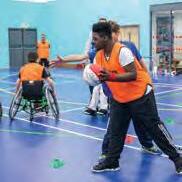



Michael, 44 and from Norwich, was diagnosed with Autism in 2012 and in 2015 started supporting nonspeaking individuals at Autism Anglia. He began training with Ambient in 2022 and was mentored by Team Leader, Sarah Green, who helped him to qualify. Sarah says: “We look at Michael’s Autism as his superpower – he can relate to, understand, and connect with the people we support from a unique perspective.

“You only get this deep understanding if you’re able to support people with disabilities in the workplace. It helps that Michael is very open and honest about his Autism. He can communicate well about what he needs, and it allows us to support him better.”
He now wants to highlight his story to encourage others with learning disabilities to take on new challenges. Michael says: “I’ve learnt a lot of new skills and worked through lots of new experiences in this particular role. I get to spend a lot more time with the people we support- I love being a part of their lives, taking them out in the community and I want to give them the best opportunities, but this is very different to my previous role with non-verbal people.
“Sarah has supported me throughout and we’ve worked together to understand what works and what doesn’t in terms of successfully acquiring new skills.’

Ambient’s Supported Living services enable people to live as independently as possible in a home of their own. This usually means a small group of people sharing a house with their own secure tenancy, with care and support tailored to meet their individual needs.
Find out about Ambient’s Supported Living Service in Norfolk: www.ambient.org.uk/services/norfolk-supported-living

44 Ability Needs Magazine
Alexandra College A National College for People with Disabilities Registered Charity No. 1065794 Registered in England No. 3387540 ● It’s being independent ● It’s making friends ● It’s rising to the challenge ● It’s learning and achieving ● It’s having fun ● It’s QAC Court Oak Road Harborne Birmingham B17 9TG Tel: 0121 428 5050 E-mail: info@qac.ac.uk www.qac.ac.uk Make
Queen
Our College Your College

Disability Awareness Day (DAD) 2023
WARRINGTON Disability Partnership, the organisers of the UK’s and possibly, the worlds, largest voluntary led pan disability exhibition are finalising the plans for this year’s 32nd annual event.
Event founder and co-ordinator Dave Thompson MBE DL said; “We are very pleased to announce that disability education specialists Expanse Learning Group and the North West’s water supplier United Utilities, are leading our list of sponsors for DAD 2023”.
The aim of this year’s event is to promote independent living through the theme “It’s what disabled people can do that matters”. DAD 2023 exhibitors will highlight solutions supporting independent living and mobility, with equipment, products, transport, employment, education, training, health and social care and leisure activities, alongside over 100 charities/support groups.
Most of this year’s exhibitors will be housed in a huge tented village of marquees that will be supported by; an extended Sports Zone, a Centre Arena, a huge Performing Arts Marquee, two further Arts Marquees for art and crafts featuring Goofus Theatre, a Silent Disco, a children’s fun fair and play areas. Entertainment will also be available adjacent to the entrance bridge and Heritage Yard.
On the day, visitors can gain an insight into the help and support that is available locally, regionally and nationally from statutory organisations, businesses and voluntary sector groups.
They can “have a go” at sports activities including Tennis, Cricket, American Football, Snooker, Rugby League, Martial Arts, Tai Chi, PowerChair Football, CrossFit and Scuba Diving in the on-site pool. In addition, Warrington Youth Zone’s giant sports inflatables.
For those looking for a more relaxed day we will have a fantastic line-up of talent in the Arts Marquee with some of the UK’s leading disabled artists including Ella Together, Carly Ryan, Creating Adventures, BSL Choir, Stars Drama, Wolf Print Dance and Groovy Movers. Supported by Rock Choir, Warrington Male Voice Choir, Signature Brass, Chester Ladies Choir and Wired for Sound. BSL interpreters will support all acts.
Alternatively, sit alongside the Main Arena watching Guide Dog display team, Reach Sled Dogs Display Team, Batida Rio Samba Band, Royal Marines Corps of Drums and sports demonstrations.
Children can visit the funfair rides or accessible onsite zoo, crazy golf, high ropes and pitch and putt.
DAD 2023 will be the finale of a week of complimentary events that includes Disability Confident Employers Workshop, Creating Adventures “One Time Only” variety show, Merseycare NHS Trust “Ignite Your Life”, Ella Together “Summertime Special”, United Utilities “Customer Vulnerability Summit”, Warrington Carers Hub “Wellbeing Festival”, “Party in the Park” for disabled young people and young carers. The finale of the week will see the UK’s top tribute band “Bjorn to be Abba”. For more details of these events, please contact the DAD Admin team on 01925 240064 or visit www.disabilityawarenessday.org.uk
Support services at DAD 2023 will include a free accessible Park and Ride service, free accessible buses from Warrington Town Centre, a free scooter and wheelchair loan service with trained enablers, British Sign Language interpreters, additional unisex wheelchair accessible toilets and over 100 trained stewards and helper’s eager to make it a day to remember for everyone.

DAD continues to capture the imaginations of organisations around the UK and worldwide with events planned in Cameroon, India, Uganda, Abu Dhabi and more. It is no wonder that DAD continues to be recognised as the world’s largest voluntary led pan disability independent living exhibition and family fun day covering physical, sensory and learning disabilities and mental health, and all ages.
Dave recalls the day it all started from a brief conversation with the rangers at Walton Gardens back in 1992; he said “Nobody would have expected the event to still be running nearly 32 years later, and that it would have grown to be recognised not just locally, but now internationally. It is testament to all of the team involved who are aptly named DAD’s Army”.
For any enquiries, please contact Warrington Disability Partnership on 01925 240064.
46 Ability Needs Magazine
CROSSWORD CLUES
ACROSS
1. Poisonous plant - edible marine snail (10)
7. Country completely surrounded by South Africa (7)
8. Goliath (5)
10. Chinese currency unit (4)
11. Hand-held firework (8)
13. Revolving (6)
15. Framework of stakes interwoven with branches to form a fence (6)
17. Second largest Channel Island (8)
18. Obscene stuff (4)
21. Recurrent theme (5)
22. Shakespeare’s Moor (7)
DOWN
1. Conchiglie, Tagliatelle etc (5)
2. Swiss creator of a chain of elegant hotels, d. 1918 (4)
3. Loud hooting cries (6)

4. From Lagos? (8)
5. Pamphlet (7)
6. Ibsen, Miller or Chechov? (10)
9. Early 20th-century American dance to ragtime music - try UK torte (anag) (6,4)
12. Royal female (8)
Who Said That? Thought of the Day Wordplay Knowledge boosting...Trivia! Tea Break Quick Crossword Quiz Who Said That?

14. Plant of the pea family with clover-like leaves (7)
16. Recover (6)
Remember When...
All these events occurred in the same year but in which year was it?
• David Bowie and Mick Jagger had a UK No.1 with Dancing In the Street
• EastEnders made its debut on TV
• Coca-Cola launched a new formula
• UK blood donors were screened for AIDS
Thought
Wordplay: FRUMENTY
The word may seem familiar but do you know what it means?
A – Hulled wheat boiled in milk
B – A fruit smoothie
C – Use of possession Who Am

23. Trouble spot (10)
19. Extract money by deceit (5)
20. From Bangkok? (4)
Quiz
1. "Where the devil are my slippers?" are the last words to which very popular Oscar winning film?
2. The title of which 1961 Hollywood romantic comedy is also a 1996 No 1 UK hit single?
3. Between 2010 and 2013 Carlos Slim Helu was number one on which list?
4. The oldest existing fort (fortress) in the United States is located in which state?
5. The world famous Blue Mountain coffee beans used to flavour the original Tia Maria are from which country?
6. Which 1994 action comedy with an oxymoronic title had the following movie poster tag line? "When he said I do, he didn't say what he did"
7. Measured in metres below sea level, which city in the West Bank is the lowest city in the world?
8. Which nickname was given to the early 20th century American entertainer Bill Robinson?
9. What same name is given to: A Mediterranean Island, an active volcano, an Italian pasty and the villain in Disney's Pinocchio?
10. Kumis is a fermented dairy product made from the milk of which animal?
Thought of the Day Wordplay Knowledge boosting...Trivia! Tea Break Quick Crossword Quiz Who Said That? Thought of the Day Wo rdplay Knowledge boosting...Trivia!

I?
• An actress, I was born in Alabama in 1902.
• I decided to become an actress at the age of 15.
• I was deemed too old to play the lead in Gone with the Wind but had success in films such as: A Royal Scandal and Alfred Hitchcock’s Lifeboat.
Who am I?
Tea Break Quick Crossword Quiz Who Said That? Thought of the Day Wordplay Knowledge


Tea Break Quick Crossword Quiz
Tea Break Quick Crossword
Ability Needs Magazine 47
Answers can be found on page 48
Tea Break is sponsored by Getting you noticed Email: info@impression-marketing.co.uk Web: www.impression-marketing.co.uk
ABILITY NEEDS
for the day
“…A day wasted on others is not wasted on one’s self…”
Charles Dickens
1. Periwinkle: 7. Lesotho; 8. Giant; 10. Yuan; 11. Sparkler; 13. Rotary; 15. Wattle; 17. Guernsey; 18. Smut; 21. Trope; 22. Othello; 23. Flashpoint
1. Pasta; 2. Ritz; 3. Whoops; 4. Nigerian; 5. Leaflet; 6. Playwright; 9. Turkey trot; 12. Princess; 14. Trefoil; 16. Recoup; 19. Mulct; 20. Thai
Quiz
1. My Fair Lady; 2. Breakfast at Tiffany's; 3. Rich List/Wealthiest people in the world; 4. Florida; 5. Jamaica; 6. True Lies; 7. Jericho (-258 m); 8. Bojangles; 9. Stromboli; 10. Horse (mare's milk)
48 Ability Needs Magazine The Journal for Special Needs Groups, Carers and People with Disabilities Reader Subscription Form Name Job Title Address Postcode Tel No Signature Date To obtain the next four issues of Ability Needs Magazine, please tick box and attach a cheque for £10 made payable to Ability Needs at: Special Needs Group Nursing Home/Care HomeBased at HomeSocial Work Department Local AuthorityNHS Trust Private HospitalSocial Service Director TERMS OF SUBSCRIPTION 7 Montgomerie Terrace, Ayr, KA7 1JL Cheque attached Receipt ABILITY NEEDS Quick Crossword ACROSS
DOWN
T E A B R E A K A N S W E R S
Remember When... 1985 Word play A. Hulled wheat boiled in milk Who Am I? Tallulah Bankhead



www.motomed.com






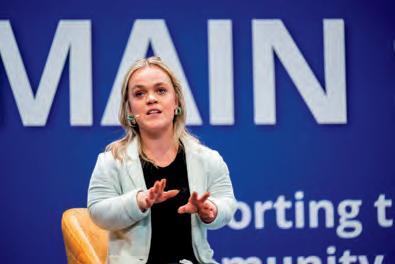
MAKE A CHANGEMAKE A CHANGEMAKE A CHANGEMAKE A CHANGE 50 Years Supporting the disability community 20-21 March 2024 NEC, Birmingham Scan the QR code to preregister for Naidex 2024 20 - 21 March 2024 NEC Birmingham APPEARANCESCELEBRITY CELEBRITY LIVE PERFORMANCES PERFORMANCES PERFORMANCES ADAPTIVE CLIMBING WALL MOBILITY TEST TRACK VILLAGE GREEN NAIDEX MARKETPLACE SEMINARS AMAZING ANDMORE! ANDMORE! ANDMORE! 200+ INNOVATIVE EXHIBITORS National Accessibility, Inclusion & Disability Expo Work without Barriers Summit Visit www.naidex.co.uk to find out more! NEW FOR 2024 10,000 Attendees Support. Skills. Success: Paving the Way to Inclusive Careers



















































































































































































































































































 Angus Long is owner of Writers4U Ltd
Angus Long is owner of Writers4U Ltd
























































